|
How can we, as teachers, make sure our students learn all the skills required in the actual labor marked? How can we teach them 21th century skills, like adaptability, critical thinking and problem solving? During the new edition of the course “Introducing Project Based Learning in the Classroom”, which took place in Palermo from 19/06/2022 to 25/06/2022, we tried to give an answer to this questions, exploring the power of Project Based Learning method. The participants came from Iceland, with Sif, Sigrún, Ingunn, Guðjón, Gylfi, Kristrún, Sigrún, Vaka, Valdís and Víðir, teachers in the school “Kársnesskóli”. During the week the teachers had the opportunity to build real projects to test with their students. Step by step we introduced new elements, so that each knowledge acquired on the PBL method was linked to a new element to be added in their projects. After analyzing the main features of the PBL method, we tried to understand together how to build a driving question, how to define learning goals and learning outcomes, which is the power of mini lessons, which kind of assessment methods are useful in this approach and, finally, which ICT tools can be used to motivate students and promote their creativity. 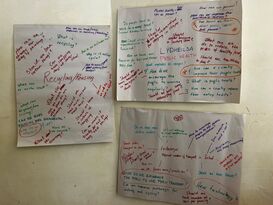 We did not miss moments of confrontation, teamwork and fun: through games and group activities we discovered what are the fundamental elements to prepare the class: creativity, inquiry, team building and team working. The theme of the week was also to become aware of the new role of the teacher in the PBL method, which becomes a facilitator of learning. The learning process starts from our students, and we, as teachers, need to make them the main actors in this path, guiding them in the process of making questions and finding answers. During the course, we also had a driving question: how can I create my own PBL plan? Piece by piece, I hope we found your “unique” answers together. Now it’s your turn! We are curious to find out how you will develop your projects in your school, and what creative and unique results will produce your students. Hoping to welcoming you again in Palermo, A presto! Discover more about this course in: https://www.erasmustrainingcourses.com/project-based-learning.html
When it comes to learning a language we all know this one rule - practice makes perfect. Learning cannot only happen in the classroom, and these last years have proven to us that we need to find new, digital ways of teaching. This poses a set of challenges: how to keep students enthusiastic and interested? How to find the adequate platforms? Can learning a language be fun and practical? Our participants could find the answers to all these questions - and more - during their weekly stay in Bologna. The new edition of the course “Teaching languages in the digital era: the best apps, web platforms and ICT solutions for learning languages” took place in Bologna from 19/06/2022 to 25/06/2022. The participants came from all across Europe, with Daniela Meier, Christina Bunte, Alina Schwede, Helga Hartmann from Heinz-Nixdorf Gesamtschule Paderborn in Germany; Sara Martín González from EOI La Laguna in Spain; Doina Jalaveanu, Laura Tarau from Gradinita cu Prigram Prelungit nr 37 Braila in Romania; Gabriella Hegyi from Kossuth Lajos Evangélikus Általános Iskola és Alapfokú Művészeti Iskola in Hungary; Vasiliki Stouri, Eleni Karakolidou from SDE Kallitheas in Greece; and Carmen Plana Nacenta, Belén Aso Cuello from CPEPA Miguel Henrández in Spain. During this course the participants learnt how to use a vast range of technological tools and to put them into use by integrating it into their teaching methods. These tools are useful not only for engagement and motivation but also to monitor progress for example in vocabulary learning, communication and individual work. This course allowed the participants to engage in a great number of practical activities and to experience these tools first-hand. For example, they competed in a live quiz while learning how to create interactive language quizzes by using web apps. In addition the participants also learnt about tools that allow the user to outline and recap the contents of the lesson and prepare for example grammar presentations, pose questions and monitor students’ attention in the classroom, especially during these times where distance learning is very common. They also explored platforms that can be useful to create worksheets and explainer videos easily. The participants also discovered specific platforms that are also very useful for language learning because they allow teachers to add voice notes, questions and voiceovers to educational videos, turning them into lessons. They also had a look at tools to edit pictures and videos - such tools can be used for a variety of purposes: preparing multimedia content, introducing a new subject or summing up an old one, challenging the students’ to create their own work in order to engage their creativity. The whole group was very active and made many learning games, which we were lucky enough to test out and share our feedback. One of the most interesting activities was experiencing and later creating their own digital escape room. We were also quizzed on many different subjects, so we could test our own trivia knowledge! Learning languages can be challenging, however by using the right tools and incorporating technology into the classroom can increase engagement, creativity, and effectiveness! We sent the participants home with a whole suitcase of ideas and tools to practice with, and a backpack of memories :) Discover more about this course at https://www.erasmustrainingcourses.com/ict-language.html
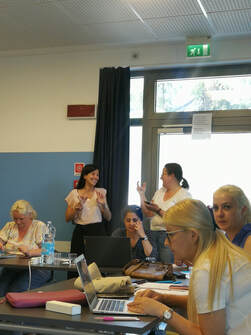 Nowadays it is fundamental to know our way around interactive learning so that we can offer our students an alternative and non-traditional style of learning and keep them engaged. We have learned to live with the uncertainty of attending class in person, so it is high time to get comfortable with tools that help us switch to online learning. The new edition of the course “Integrating ICT and new technologies into teaching and education” took place in Bologna from 10/06/2022 to 25/06/2022. The participants came from all across Europe, with Janina Müller-Süß from IGS Büssingweg in Germany; Johanna Hinriksdottir, Thorbjorg Erla Sigurdardottir from The Commercial College of Iceland; Sílvia Frade from Agrupamento de Escolas de Carcavelos in Portugal; and Malaeru Patricia, Stefan Loredana, Stefanescu Loredana, Savu Elvira, Manescu Madalina from Voinesti High School in Romania. First of all they had a look at the most simple and easy tools to edit pictures and videos that are very effective when it comes to teaching. Such tools can be used for a variety of purposes: preparing multimedia content, introducing a new subject or summing up an old one, challenging the students’ to create their own work. The group explored apps that helped them create interactive boards, so they can work in real time with their students. Creating this collaborative environment increases interest and helps track students’ engagement during the lesson. Participants also learned how to create a website following a few easy steps. Thanks to this course this group was able to experiment with an intuitive app that could help them create a website for their schools, or blogs for their subjects. Moreover, the participants had the chance to dive into the technological world with plenty of practical activities such as presentations, virtual quizzes, learning how to create engaging social media content, using tools dedicated to organizing graphics, posters and collages and much more. 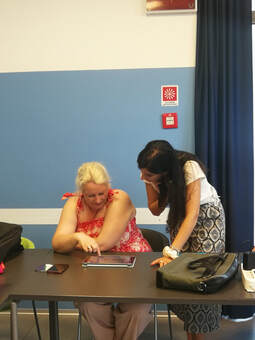 The participants came from different backgrounds, with schools that had different needs and habits - this created an interesting discussion a lot of the time. For example, an ongoing topic was about social media presence (the rules, possible dangers, positive aspects), or how to engage children without the possibility of using their phones. This course allowed participants to confront themselves with each other and learn from their shared experiences. The participants left this course with a new knowledge of interactive learning and a new set of tools, ready to use them in their classrooms. And remember - practice makes perfect! Discover more about this course at https://www.erasmustrainingcourses.com/integrating-ict-into-teaching-and-training.html
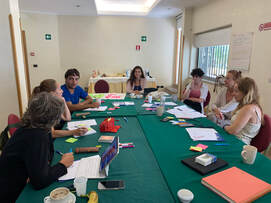 Today, a lot of students decide to drop out of school and European Early School Leaving rates are still high. For this reason, it is more than important to work on factors that can help preventing and managing Early School Leaving and conflicts. The new edition of the course “Preventing conflicts and tackling Early School Leaving” aimed at teaching how to identify the causes of this phenomenon and the best approaches and strategies to prevent, tackle and reduce it as well as the keys to conflict management. It took place in Palermo from 12/06/2022 to 18/06/2022. The participants came from different parts of Europe, with Charlotte, Eva, Marina, Raúl and Queila coming from the IES Islas Canarias in the Canaries, Spain; Ildikó coming from Fehérlófia Waldorf School, Hungary; and Beatriz coming from the IES Ausiàs March in Spain. On the first day, participants explored the topic of Early School Leaving from different national perspectives, since it is a widespread problem across Europe. They tried to define what Early School Leaving means and identify the main risk factors, which can be social, familiar, individual and related to the school environment. This allowed the participants to draw and share with the others a realistic picture of their school experience with Early School Leaving, starting from the underlying causes, and finishing with the potential consequences. Then, we focused on conflict management. We tried to have a change perspective. With the support of an inspirational TED Talk and a lot of activities, the group who initially associated the idea of conflict to something essentially negative, realized afterwards how conflicts can become great opportunities to learn about ourselves and the others, improve relationships, and express ourselves and our needs better. Moreover, we analyzed different conflict management styles and discussed their concrete application in different situations. We also tried to understand how we can engage students more and make them be more active and participative during lessons thanks to some innovative teaching methods. For this reason, we looked at some ICT tools and, through some practical activities, participants learned how they can use them with their subjects. Then, the group focused on how to battle negativity in the classroom, through group reflection and practical activities. They tried to define and characterize the main “negative” student types and developed practical tips and suggestions on how to deal with them in the most effective ways. The participants also tried to transform their mindset from fixed to growth and learned how to foster a mindset of growth in their students. Moreover, they looked at how to deal with bad beliefs and improve students’ self-esteem. Through visual tasks and group reflection, we analyzed the phenomenon of bullying and we focused on the characteristics of a bullying behaviour, the different types of bullying and the roles which are played in a bullying situation. 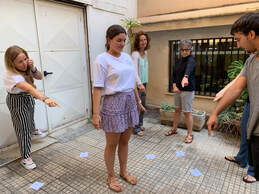 Finally, we focused on cooperative learning and different cooperative methods that can be used at school in order to make everybody collaborate and be responsible of something. The group also practiced some non-formal activities to reflect the importance of membership and collaboration. The key word of this week training course was “transformation”: we learned how to change perspective on conflicts, how to transform the strong and sometimes negative energy of some students into something positive and productive, how to change our mindset from fixed to growth, how to transform a group of people into a team. All the teachers gave their contribution to make the most of the course by sharing ideas and experiences. ELA is looking forward to welcoming you again! Discover more about this course in: https://www.erasmustrainingcourses.com/early-school-leaving.htm
Nowadays the educational relationship between teachers and students, especially after a two year pandemic, is more complex than ever. In this critical situation schools need open minded teachers who can question themselves, learning new teaching methods and reviewing the old ones. On one hand this means teachers have to manage new technologies and include them into the learning process, but it also means they have to go back to the basic concepts, like the “feedback” and “assessment” ones, and develop a new definition of them. All of this and even more was presented by Francesco Tarantino in the new international course named “Effective formative assessment and feedback management in education”.
The first two days the main topics were “feedback” and “assessments”, what they are, the differences between them, how and when they’re useful/painful to the students. The following days there has been talk about many interactive virtual tools to use in class to make students more motivated and enthusiastic than ever. Just to make some examples, the Maltese group of teachers theoretically and practically learned how to utilise websites like Socrative and Mentimeter.
Either if you are a seasoned teacher or not, this course will open your mind and let you grow into a better teacher! Learn more about the course here:
https://www.erasmustrainingcourses.com/formative-assessment.html 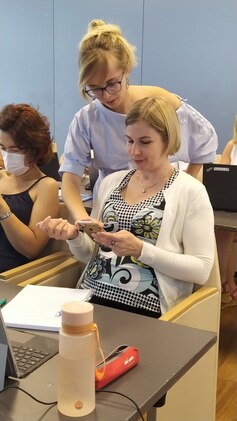 During these past years traditional education had to leave space for virtual lessons and online classes. Because of this we had to adapt and think about a new way to teach and learn remotely. In this case using new technologies, digital tools and interactive learning platforms demonstrated to be a winning strategy. These technologies allowed teachers all over the world to maintain an engaging and dynamic environment in virtual classes too. The same tools proved their utility inside a real classroom as well, especially when it came to students’ attention and enthusiasm. The new edition of the combined courses “Making the most of new technologies, apps and social media in the classroom” and “Discover the best apps and tools for E-learning, Distance learning and Web Design” concentrated exactly on these matters. This session of the course took place in Bologna from 12/06/2022 to 18/06/2022. The participants came from all across Europe, with Marisa Afonso, Amália Clara Clara Maria Fernandes Cheio from Agrupamento de Escolas de Carcavelos and Escola Secundária de Carcavelos in Portugal; Ute Glunz-Eikerling, Lena Schütte, Anna Knaup from Sekundarschule Horn - Bad Meinberg in Germany; Kirsi Ryhänen from Nurmes High School in Finland; Katarina Lovenjak from Gimnazija Kranj in Slovenia; María Cristina Gil Medina, Beatriz Betancor Cardona, Ruth Garcia Calderin, Elba María García Calderín from CEPA FUERTEVENTURA NORTE and CEPA Fuerteventura Sur in Spain; Tom Van Hoof Ergi Vercaigne from Sint Ursula instituut in Belgium; Honorata Zych, Agnieszka Żywot, Krzysztof Dychała from SP im. M C-Skłodowskiej w Mąchocicach Kapitulnych in Poland and Maria da Purificação Gabriel Garcia Pica, Salete Mansos Felício from Agrupamento de Escolas de Moura in Portugal. During this course the participants learnt how to use a vast range of technological tools and to put them into use by integrating them into their teaching methods. The goal was to apply these new technologies into both real and virtual classrooms in order to teach easily and more effectively. First of all they had a look at the most simple and easy tools to edit pictures and videos that are very effective when it comes to teaching. Such tools can be used in fact for a variety of purposes: preparing multimedia content, introducing a new subject or summing up an old one, challenging the students’ to create their own work in order to engage their creativity. Another topic explored was how to build a website, which can serve multiple options of use in distance learning. By setting up different pages and enriching them with contents, our participants had the opportunity to personalize their website, write a blog to report the development stages of a project, create portfolios etc.. The New Tech. group put a lot of emphasis on how to be more social online. We discussed social media as a medium to engage students, specifically Instagram and TikTok. The course went on discussing other tools for collecting and sharing resources and content. The group learnt about platforms that allowed them to collect and enrich videos, images, texts, pdf, and other materials, and share all this content with their students in just a simple click. These tools can be useful for example to describe different parts of a picture, especially in scientific subjects, and to provide a deeper context for a richer learning experience when approaching a new topic, for example in foreign language studies. Participants also practiced tools that function as collaborative walls, where every user is encouraged to post and contribute in building a more exhaustive collection of information. Amongst the many tools they discovered they also learnt about interactive presentations in which the teacher can request the class’ opinion by submitting polls, creating word clouds, or asking for questions or feedback on the topic being presented, creating video lessons, particularly effective in these times, and online learning quizzes, very useful to test the progress of the students. The participants also had a chance to experience a digital escape room - and in the end make their own version! The participants left this course with a new knowledge of interactive learning and new technologies and a new set of tools, ready to use them in their real and online lessons. We hope that you upkeep your motivation for warm-ups in the morning and stay “usually in a good mood”! Discover more about this courses:
https://www.erasmustrainingcourses.com/social-media-in-the-classroom.html https://www.erasmustrainingcourses.com/e-learning-and-web-design.html Erasmus Learning Academy (IT), Agrupamento de Escolas de Anadia (PT), Education Center of Rokiskis Municipality (LT), CEPA TERESA ENRIQUEZ (ES), Maria's World Foundation (BG) are proud to present the Erasmus+ KA2 Strategic Partnership "Learning Opportunities on Digital and Employability skills for Young Adults with Behavioral and Cognitive Disabilities (LINK)" co-funded by the European Union. The need analysis undertaken pointed out that the completion of secondary education is a crucial and scary moment for adults with behavioural and cognitive disabilities and their families. In front of them there is the risk of being excluded from society and from the job market. Secondary schools make a great effort to support the transition to the job market but many young adults with behavioural disorders and mild cognitive disabilities, despite having the potential for actively participating in the society and its economy, fail this transition. In this context, post-secondary and adult education can play a crucial role. It emerges however that only few adult education institutions and disability day care centers offer structured high learning possibilities to adults with behavioural and cognitive disabilities (AwBCD). Following the needs analysis, the main aim of the project is to allow AwBCD aged 19-24 to develop digital and employability skills enabling them to actively participate in the society and find a job. Objectives The partnership will pursue the following project objectives:
Results The project activities aim to achieve two main results. The first one is a modular blended adult education course on digital and employability skills, with 90 hours of face-to-face instruction and 120 hours of distance learning. Digital pedagogy and gamification mechanics will be applied to both the classroom and the distance education offering new and more tailored ways of learning. While the second one will be a Handbook on digital and gamified learning activities for adults with behavioral and cognitive disabilities, based on the concrete experiences of the partners including the ones of the local LINK courses. LINK handbook will be structured as a practical tool enabling adult educators to easily integrate in their existing courses digital activities and tools, new technologies, game mechanics and game-based digital apps. It will serve as well as a supporting reference to implement the LINK course or to reuse and adapt it to be totally or partially embedded in another existing curriculum (both in adult education or in a different sector). Activities planned during the project The project plan includes various activities to prepare, shape and guide the project results development. An Open Web Conference on Gamification, Game-based learning and digital learning will be organized online targeting people among internal staff of partner organizations, associated partners and general public in which the partners will have a chance to present the project and its objectives, besides highlighting the importance of the pedagogies explored in the framework of LINK. All participants will then be free to contribute by sharing their experience and best practices on the use of gamification, for the purpose of providing a fertile ground to develop the Project Results, creating engagement and encouraging active participation among the partner organization. A solid Awareness Campaign will be carried out through online social media campaigns, virtual meetings and events, face-to-face meetings targeting local stakeholders and AwBCD. The aim is to raise awareness on the needs and potential of AwBCD and the learning opportunities that can unleash it, sensitise the audience towards social inclusion and showcase successful stories of members of the target group. A 8 hour training for associated partners will be carried out in each partner country to showcase the use of LINK Adult Education Course and select the adult educators who will be involved in the Local Adult Education Courses, which will also be organized in each country to implement the LINK course. A selected target group will be involved, while adult Educators will benefit from a Draft version of the LINK Handbook supporting them in the delivery of the course. Specific measures will be enacted to ensure support for active participation, logistic support and follow-up support. The aim of these two activities is to empower AwBCD to experience an innovative educational and training opportunity, gain a feedback about the LINK Adult Education Course and inspire and enable Adult Educators to organize high quality learning opportunities for AwBCD. Dissemination activities are also crucial in order to ensure that activities and results are properly promoted to the external audience. Besides traditional social media reach, the project partners will engage in meeting with local stakeholder and in the creation of the “LINK Network” for cross-sectoral cooperation serving the purpose of creating new learning opportunities involving diverse stakeholders at the EU level. The main dissemination activity will be 5 Multiplier Events (1 in each country), they will involve at least 300 among representatives and staff of specialized centres for people with disabilities, Adult Educators working with people with disabilities, Adult educator trainers, olicy makers, AwBCD and their families. In particular, the events intend to illustrate the project achievements while raising awareness on the benefits of gamification education with learners with behavioural and cognitive disabilities and other groups with fewer opportunities. Expected impact LINK is expected to impact on several levels: At the LOCAL LEVEL: We expect benefits for AwBCD reinforcing their awareness of the learning possibilities they have and also inspiring them to engage more in education. We expect also an impact on representative and staff of specialized centres for people with disabilities, adult organizations working with people with disabilities and policy makers so as to reduce the distances between them and the families of AwBCD and unleash their willingness and ability to promote and engage in innovative learning and educational opportunities to foster digital and employability skills of AwBCD. At the REGIONAL and NATIONAL LEVEL, we expect to see an impact on institutions in the adult education sector that will be able to use the results of the project to improve their services. The contribution of associated partners and stakeholders will be crucial for a more inclusive digital transformation of the education ecosystem. At EUROPEAN LEVEL, the expected impact is related to adult education organizations, education and support centres for people with disabilities and other interested beneficiaries. Through dissemination activities and a transnational cooperation, the project will give visibility to the opportunities promoted by the European Programs, especially Erasmus+ in the Adult Education sector and this will enhance the aptitude for the design of transnational projects and the development of new adult education practices. At the SYSTEM LEVEL, LINK will reinforce the inclusive education system producing uptakes of adult education learning, a higher focus on education and training of the disability service sector and the affirmation of gamification as an effective pedagogy for social inclusion. Also, it will lead to a different approach in designing education paths, a digital transformation of the inclusive education system and an increased human and social capital of the EU. Erasmus+ Project LINK - Learning Opportunities on Digital and Employability Skills for Young Adults with Behavioural and Cognitive DisabilitiesLe organizzazioni Erasmus Learning Academy (IT), Agrupamento de Escolas de Anadia (PT), Education Center of RokiskisMunicipality (LT), CEPA TERESA ENRIQUEZ (ES) e Maria's World Foundation (BG) sono orgogliose di presentare il progetto a Partnership Strategica “LEARNING OPPORTUNITIES ON DIGITAL AND EMPLOYABILITY SKILLS FOR YOUNG ADULTS WITH BEHAVIOURAL AND COGNITIVE DISABILITIES (LINK)” all’interno del programma Erasmus+ KA2 e cofinanziato dall'Unione Europea.
L'analisi dei bisogni che è stata svolta ha messo in luce quanto il completamento dell'istruzione secondaria sia un momento cruciale e spaventoso per gli adulti con disabilità comportamentali e cognitive e per le loro famiglie. Davanti a loro c'è il rischio di essere esclusi dalla società e dal mercato del lavoro. Sono molteplici gli sforzi che le scuole secondarie fanno a sostegno della transizione verso il mercato del lavoro, nonostante ciò molti giovani adulti con disturbi comportamentali e lievi disabilità cognitive, pur avendo il potenziale per partecipare attivamente alla società e contribuire all’economia del paese, falliscono in questo passaggio. In questo contesto, l'istruzione post-secondaria e degli adulti risulta ricoprire un ruolo fondamentale. Tuttavia, stando ai numeri, solo pochi istituti di istruzione per adulti e centri diurni per disabili offrono possibilità di apprendimento ben strutturate e di qualità agli adulti con disabilità comportamentali e cognitive (AwBCD). Facendo seguito all'analisi dei bisogni, l'obiettivo principale del progetto è consentire agli AwBCD con un’età compresa tra i 19 e i 24 anni di sviluppare digital and employability skills che consentano loro di partecipare attivamente alla società e di trovare un lavoro. Obiettivi La partnership si impegnerà a perseguire i seguenti obiettivi:
Le attività del progetto mirano a raggiungere due risultati principali. Il primo sarà un corso diviso in moduli che mira allo sviluppo delle digital and employability skills fatto su misura per i bisogni di adulti con disabilità cognitive e comportamentali con un’età compresa tra i 19 e i 24 anni che hanno concluso il percorso scolastico secondario, ma non riescono a fare il loro ingressonel mondo del lavoro. Il corso LINK sarà erogato in modalità blended con 90 ore di insegnamento frontale e 120 di apprendimento a distanza. Saranno applicati i principi della pedagogia digitale e della Gamification sia per la formazione in aula che per quella a distanza, offrendo nuove modalità di apprendimento più personalizzate. Il secondo sarà un manuale sulle attività di apprendimento digitale e gamificato per adulti con disabilità comportamentali e cognitive, basato sulle esperienze concrete dei partner, comprese quelle dei corsi LINK locali. Il manuale LINK sarà strutturato come uno strumento pratico che consentirà agli educatori per adulti di introdurre facilmente nei loro corsi attività e strumenti digitali, nuove tecnologie, meccaniche di gioco e applicazioni digitali basate sul gioco. Servirà anche come riferimento per implementare il corso LINK e potrà esseree adattarto per essere inserito totalmente o parzialmente in altri curricula (sia nel campo dell’educazione degli adulti che in altri). Attività previste durante il progetto Sono previste varie attività per preparare, modellare e guidare lo sviluppo dei risultati. Verrà organizzata una Open Web Conference online sulla Gamification, apprendimento game-based e apprendimento digitale, rivolta al personale interno delle organizzazioni partner, ai partner associati e al pubblico in generale, in cui i partner avranno la possibilità di presentare il progetto e i suoi obiettivi, oltre a sottolineare l'importanza delle pedagogie esplorate nell'ambito di LINK. Tutti i partecipanti saranno poi liberi di contribuire condividendo le proprie esperienze e le migliori pratiche sull'uso della gamification, allo scopo di fornire un terreno fertile per sviluppare i risultati del progetto, creando coinvolgimento e incoraggiando la partecipazione attiva tra le organizzazioni partner. Una solida campagna di sensibilizzazione sarà condotta attraverso campagne online sui social media, incontri ed eventi virtuali, incontri in presenza rivolti agli stakeholder locali e agli AwBCD. L'obiettivo è quello di sensibilizzare il pubblico riguardo bisogni e le potenzialità degli AwBCD e sulle opportunità di apprendimento che possono metterle in risalto, di sensibilizzare il pubblico verso una maggiore inclusione sociale e di mostrare storie di successo di membri del gruppo target. In ogni Paese partner verrà svolta una formazione per i partner associati con una durata di 8 ore allo scopo di illustrare l'uso del corso di formazione per adulti LINK e selezionare gli educatori per adulti che saranno coinvolti nei corsi locali organizzati in ogni Paese per implementare il corso LINK. Verrà coinvolto un gruppo target selezionato, mentre gli educatori per adulti beneficeranno di una bozza del Manuale LINK che li supporterà durante l’erogazione del corso. Saranno adottate misure specifiche per garantire il sostegno alla partecipazione attiva, il supporto logistico e il follow-up. L'obiettivo di queste due attività è quello di permettere agli AwBCD di sperimentare un'opportunità educativa e formativa innovativa, di ottenere un feedback sul corso di formazione per adulti LINK e di ispirare e dare la possibilità agli educatori per adulti di organizzare opportunità di apprendimento di alta qualità per gli AwBCD. Anche le attività di divulgazione saranno cruciali per garantire una adeguata promozione delle attività e dei risultati verso il pubblico esterno. Oltre alla tradizionale diffusione sui social media, i partner del progetto si impegneranno a realizzare degli incontri con gli stakeholder locali e a curare la "Rete LINK" per la cooperazione intersettoriale allo scopo di creare nuove opportunità di apprendimento coinvolgendo diversi stakeholder a livello europeo. La principale attività di disseminazione sarà costituita da 5 multiplier events (1 in ogni Paese), che coinvolgeranno almeno 300 persone tra rappresentanti e personale di centri specializzati per persone con disabilità, educatori per adulti che lavorano con persone con disabilità, formatori di educatori per adulti, policy makers, AwBCD e le loro famiglie. In particolare, gli eventi intendono illustrare i risultati del progetto e sensibilizzare sui benefici della gamification educativa per gli studenti con disabilità comportamentali e cognitive e per altri gruppi con minori opportunità. Impatto atteso L'impatto di LINK è previsto a diversi livelli: A LIVELLO LOCALE: sono attesi benefici per gli AwBCD: sarà rafforzata la loro consapevolezza delle possibilità di apprendimento e saranno ispirati a impegnarsi maggiormente nell'istruzione. È atteso anche un impatto sui rappresentanti e sul personale dei centri specializzati per le persone con disabilità, sulle organizzazioni di adulti che lavorano con le persone con disabilità e sui policy makers, in modo da ridurre le distanze tra loro e le famiglie degli AwBCD e liberare la loro volontà e capacità di promuovere e impegnarsi in opportunità educative e di apprendimento innovative per promuovere le digital and employability skills degli AwBCD. A LIVELLO REGIONALE e NAZIONALE, è atteso un impatto sulle istituzioni del settore dell'educazione degli adulti, le quali potranno utilizzare i risultati del progetto per migliorare i loro servizi. Il contributo dei partner e degli stakeholder associati sarà fondamentale per una trasformazione digitale più inclusiva dell'ecosistema educativo. A LIVELLO EUROPEO, l'impatto previsto è legato alle organizzazioni di educazione degli adulti, ai centri di educazione e supporto per le persone con disabilità e ad altri beneficiari interessati. Attraverso le attività di disseminazione e la cooperazione transnazionale, il progetto darà visibilità alle opportunità promosse dai programmi europei, in particolare al programma Erasmus+, nel settore dell'educazione degli adulti e questo rafforzerà l'attitudine all'ideazione di progetti transnazionali e allo sviluppo di nuove pratiche di educazione degli adulti. A LIVELLO DI SISTEMA, LINK promuoverà un sistema di istruzione inclusiva mirando ad un aumento dell'apprendimento in età adulta, una maggiore attenzione all'istruzione e alla formazione da parte del settore dei servizi per la disabilità ed inoltre l'affermazione della gamification come pedagogia efficace per l'inclusione sociale. Porterà ad un approccio diverso nei confronti della progettazione di percorsi educativi, ad una trasformazione digitale di un sistema educativo ancora più inclusivo e ad un aumento del capitale umano e sociale dell'UE. The new edition of the course “The best for preschool teachers”, which took place in Palermo from 06/06/2022 to 10/06/2022, had as participants a group of Estonian teachers from the School Rakvere Kungla kindergarten: Evely, Riina, Reet, Elizaveta, Alla, Kristiina, Marika, Helena, Birgit, Kristiina, Liidia, Terje and Anne. After some team building activities, the first day we introduced the Italian system, and the main differences and similarities with other countries in Europe. During the other days of the week, we had the opportunity to deepen innovative preschool teaching methods. Firstly, we discovered the key elements and theories of non formal education, practicing them trough practical activities and games, where the “debriefing” guided participants in the understating of the usefulness of this approach. 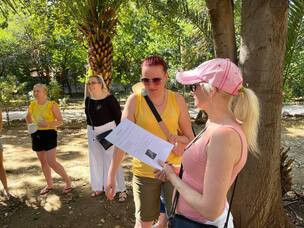 Secondly, we explored the power of Outdoor Education with an “outdoor challenge” in the beautiful park “Villa Trabia”. This challenge was an opportunity to understand in practice the 10 principles of Outdoor Education developed by Hann, and to experiencing the benefits of learning in nature. Lastly, we deepened the Montessori method, analyzing the role of the educator, the characteristics of the environment and the specific learning materials, learning how to help our pupils “to do it themselves”. During the week we had the opportunity to meet Anna, a preschool teacher in Palermo. She explained the value of teaching “life skills” in school starting from the first years of education, as the best way to prevent behaviours at risk to health, psychological and physical. Thanks to her, we had a rich sharing moment whereby teachers from the Estonian school had the chance to explore what a real preschool teacher does during a school day in Italy. Palermo, with its colours and traditions, was the background of this amazing training week, giving the teachers the possibility to experience the real “Sicilian life”. Our best hope now is to have given you a rich set of tools and methods to use inside your school, and to have left in your hearth a little piece of Palermo. Grazie mille, ci vediamo presto! Discover more about this course in: https://www.erasmustrainingcourses.com/preschool-teacher-training.html
Managing preschool children has a lot of challenges. It is difficult in itself, and additional pressure is added on the teachers to know how to shape these easily influenced kids. This is why the profession calls for constant improvement and change - educators have to adapt to new methods, keep up with new studies, and constantly look for ways to make their students’ future better. This week our participants had a chance to learn about international pedagogical methods, especially the Italian system. The new edition of the course “The best for preschool teachers” took place in Bologna from 5/06/2022 to 11/06/2022. The participants came from all across Europe, with Helen, Marge, Airi, Jaanika from Rakvere Kungla kindergarten in Estonia; Dina, Mara, Julio form EBI Água de Pau in Portugal; Martyna, Kinga, Agata, Bernadeta form PSPW Mielec in Poland; Katarína from Special primary School in Vranov nad Topľou in Slovakia; Anda and Liana form Saldus pre-school educational institution “Pasaciņa” in Latvia; Jane and Katarina from Haapsalu Lasteaed Tareke in Estonia. 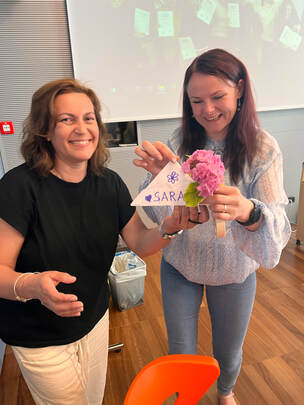 On Monday we took the time to get to know each other - breaking the ice with some games, discussing expectations and fears for the upcoming week, and giving some context to the participants’ experience by presenting their schools. Then it was time for a small trip. The teachers and the course trainer headed to Reggio Emilia to visit the Loris Malaguzzi Centre where an expert guided us throughout the exhibitions of the Centre. Teachers had a chance to learn more about the history, the materials, the projects and the experiences, which make the Reggio Emilia approach unique in the world, whilst also getting to know the town a little better with a guided tour. Wednesday was for non-formal education and experiential learning. We played a few games and activities to better understand these topics. It was then time for another visit this time to explore Outdoor Education. We visited an outdoor preschool and witnessed the wonder of learning in the eyes of the children. Thanks to the passionate teachers who accompanied us, this experience was an eye opener on the deep need of nowadays society to bring our kids back to the authentic and real world, and the benefits this might entail for learning to respect the environment. 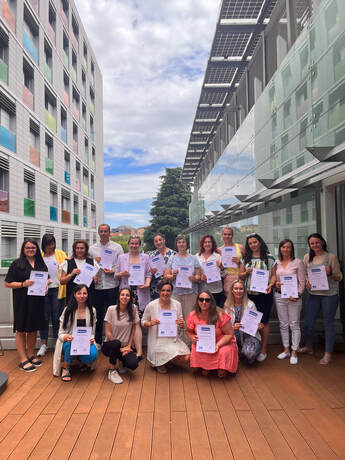 Moving on discovering the Italian preschool experience, we had the pleasure of hosting a Montessori teacher from a Montessori preschool. The group delved into the Montessori method, a philosophy and pedagogy developed by Maria Montessori in the early 19th century. A presentation of pictures of an authentic Montessori environment and materials was the starting point for discovering the method in a practical and experiential way. One of the last - but not least! - activities was a challenge to invent a new activity for the participants’ own target group. In a concluding manner, they had to use the methods and approaches discovered during the course. They later presented their ideas and collected valuable feedback from each other. There were a lot of ideas incorporating outdoor education, with a focus on caring for the environment. After an active week, we had to say goodbye to the group. We hope you can implement all your ideas and projects in the upcoming school year, and share your knowledge back at home. Ciao, see you soon! Discover more about this course at: https://www.erasmustrainingcourses.com/preschool-teacher-training.html Heutzutage ist es leicht, sich überfordert zu fühlen und zu denken, dass wir unsere täglichen Aufgaben nicht bewältigen können. Stressige Situationen können sich sowohl in unserem Berufs- als auch in unserem Privatleben manifestieren, und es kann schwierig sein, Konflikte zu vermeiden, wenn wir uns in einem stressigen Umfeld befinden. In diesem Kurs hatten die Teilnehmer und Teilnehmerinnen die Möglichkeit, durch theoretische und praktische Aktivitäten Instrumente zur Bewältigung und Überwindung von Konflikten und Stresssituationen kennenzulernen. Das Kurs "Stress- und Konfliktmanagement: der Weg zu Resilienz und Zufriedenheit" fand vom 12.06.2022 bis 17.06.2022 in Bologna statt. Die Teilnehmer und Teilnehmerinnen arbeiten alle bei der LEB, ein norddeutsches Unternehmen für Erwachsenenbildung, aber kamen von verschiedene Zweige und Abteilungen. Am ersten Tag reflektierten die Teilnehmer und Teilnehmerinnen die Bedeutung des Wortes Stress durch Brainstorming-Runden in Gruppen. Stress wird durch eine Reihe von Stressoren verursacht, die mit vielen Faktoren zusammenhängen können: körperlich, umweltbezogen, familien-oder arbeitsbezogen. Geringe Mengen an Stress können jedoch auch positive Auswirkungen haben und uns dazu bringen, unsere Ziele zu erreichen. Deswegen war es im Kurs wichtig zwischen Distress (negativ) und Eustress (positiv) zu unterscheiden. In diesem Kurs lernten die Teilnehmer und Teilnehmerinnen auch eine Reihe von kognitiven und verhaltensorientierten Strategien zur Bewältigung von Stresssituationen am Arbeitsplatz kennen. Durch Gruppenaktivitäten hatten sie die Möglichkeit, ihre Planungs- und Zeitmanagementfähigkeiten zu evaluieren und zu verbessern. Um Stresssituationen besser bewältigen zu können, übten sie Atemübungen, Muskelentspannung und Visualisierung.
Um Konflikte lösen zu können, muss man wissen, wie man effektiv kommuniziert. Die Gruppe diskutierte verschiedene Kommunikationsstile und durchführte Gruppenaktivitäten, bei dene jedes Mitglied zur Lösung eines Konflikts beitragen musste. Obwohl es schwierig sein kann, einen Konflikt zu lösen, erkannten die Teammitglieder, dass so eine Situation auch eine Gelegenheit sein kann, zu wachsen und zu lernen. Alle Methoden können auch am Arbeitsplatz und im Klassenzimmer angewendet werden. Da die Teilnehmer unterschiedliche Hintergründe, Alter und Arbeiten hatten, bot sich ihnen die Gelegenheit, ihre gegenseitige Erfahrung zu teilen und konfrontieren. Noch wichtiger ist, dass dieser Kurs ihnen gezeigt hat, dass sie nicht nur jetzt Werkzeuge haben, um mit stressigen Situationen umzugehen, sondern dass es manchmal auch einen positiven Ausgang aus einem bestehenden Konflikt geben kann. ELA bedankt sich für Ihre Teilnahme und freut sich darauf, Sie wieder begrüßen zu dürfen! Mehr über diesen Kurs unter: https://www.erasmustrainingcourses.com/stress-management.html
|
Welcome to the ELA Blog. Here you will find articles and photos of our courses and have a look at the topics addressed during the week in Bologna, Palermo and Tenerife. You will also have the chance to take a peek at our projects and check out what we have been up to.
Archives
July 2024
Categories |
-
Course catalogue
- 2023-2024 course catalogue
- Soft Skills >
- ICT and New Technologies >
- Inclusion and Diversity >
-
Innovative Teaching Methods
>
- Innovative teaching methods discovery
- Non-formal education teaching methods
- Dual education and work-based learning
- Teaching leadership and entrepreneurship
- Project based learning
- Game based learning and gamification
- Green skills
- Outdoor education
- Outdoor education trekking edition
- Promoting creativity and critical thinking
- Languages and EU projects >
- Preschool >
- Erasmus Plus KA1
- What we do
- About us
- Locations
- Blog
- Contact us
 English
English български
български Čeština
Čeština Español
Español Français
Français ελληνικά
ελληνικά Italiano
Italiano Polski
Polski Português
Português Română
Română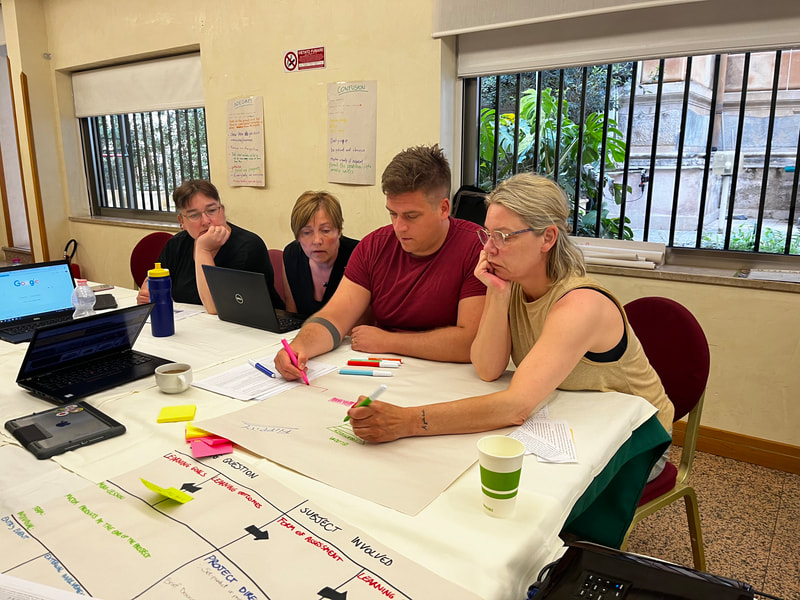
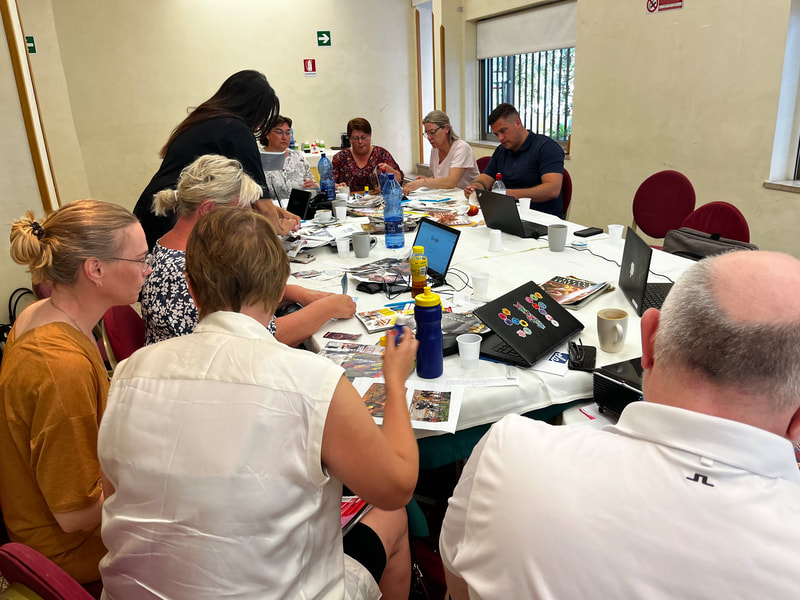
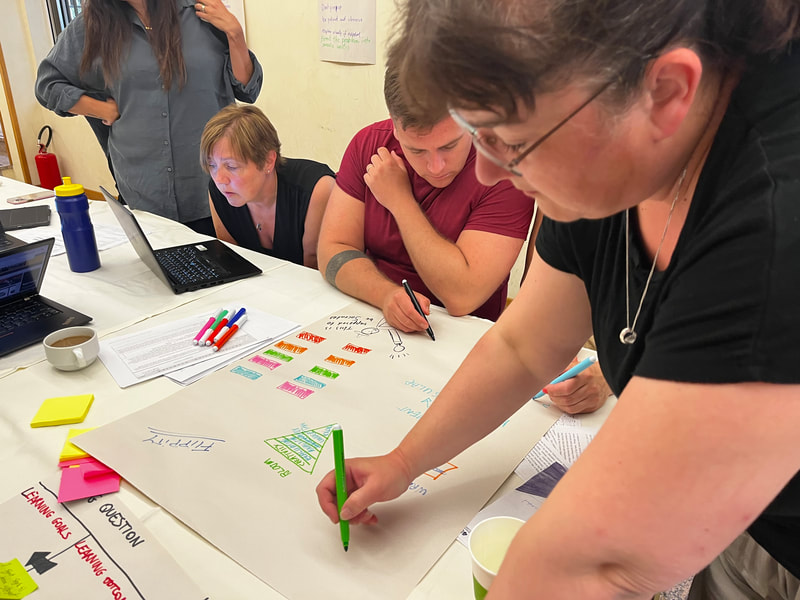
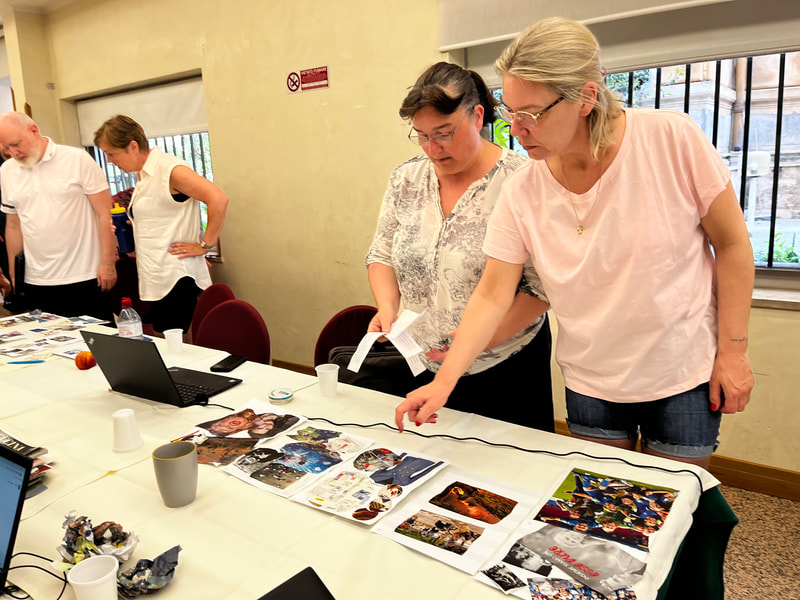
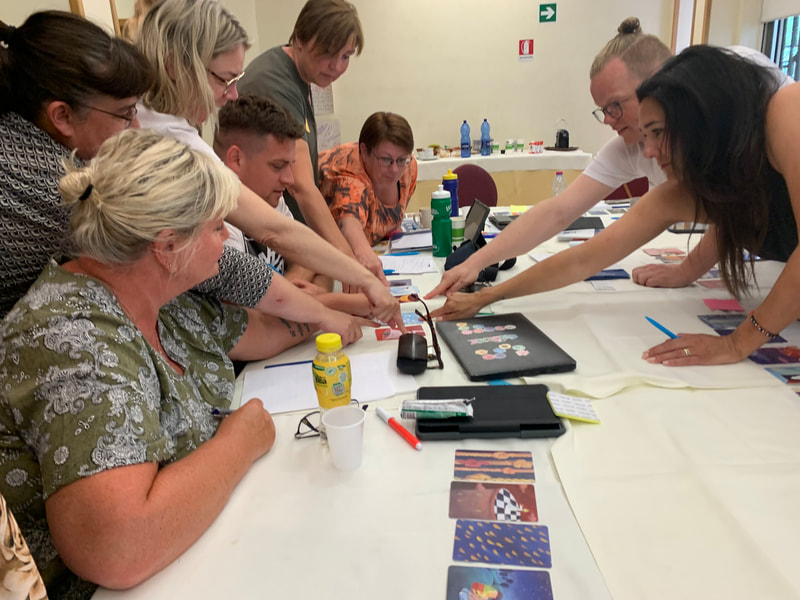
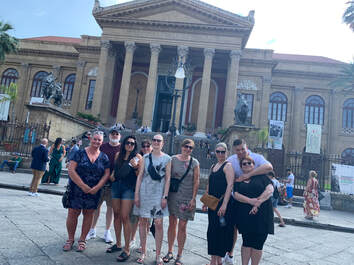
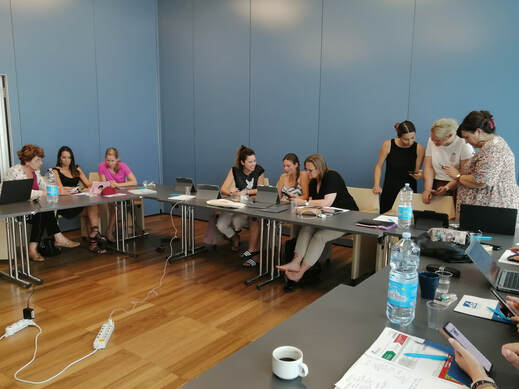
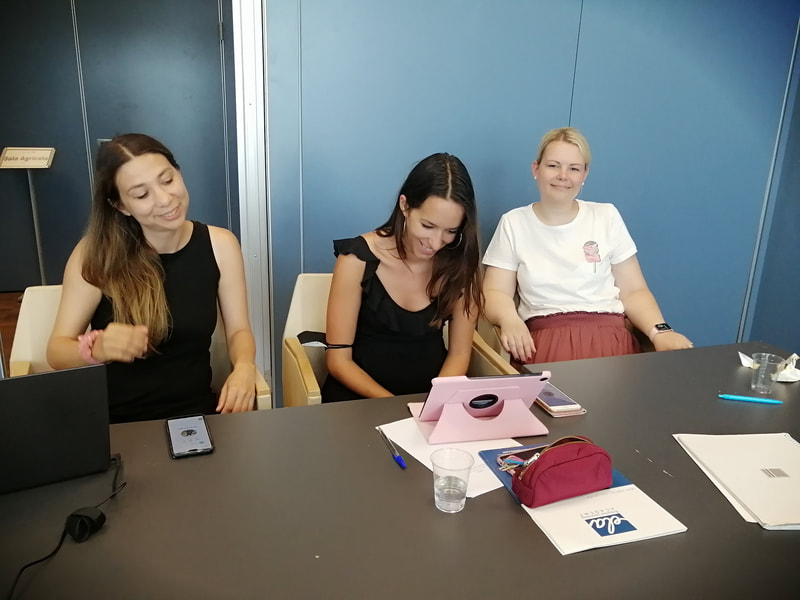
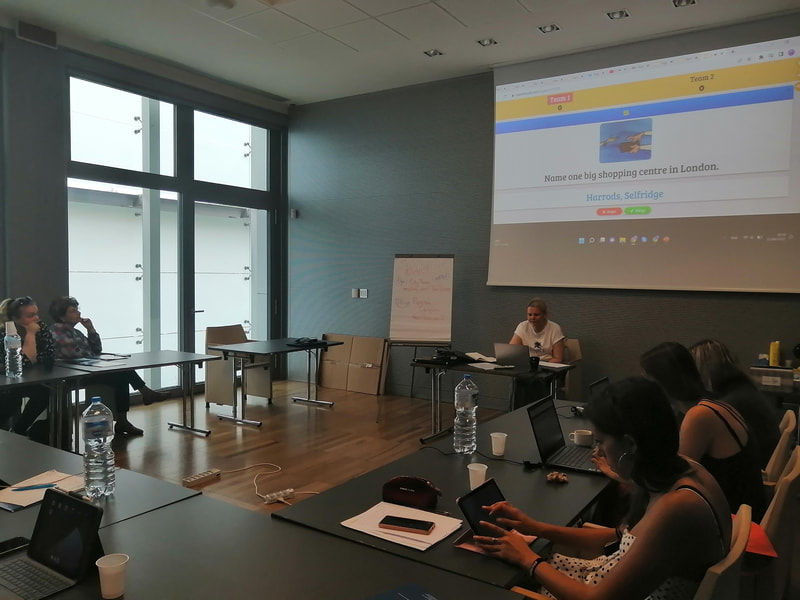
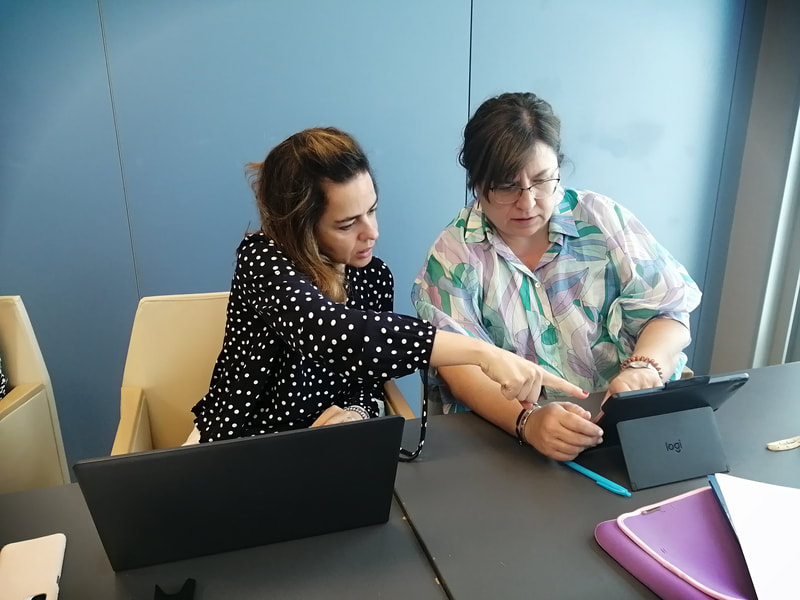
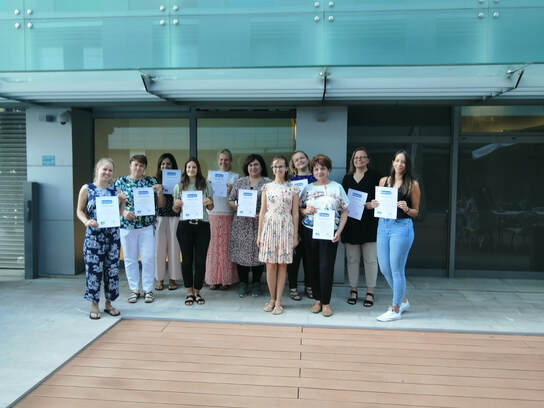
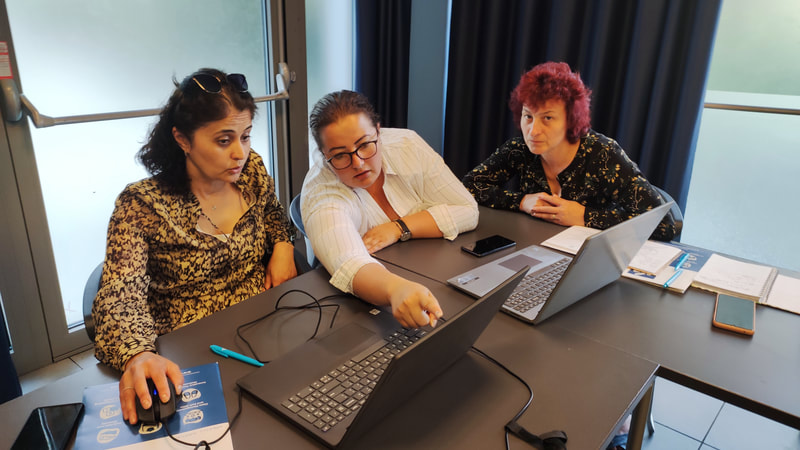
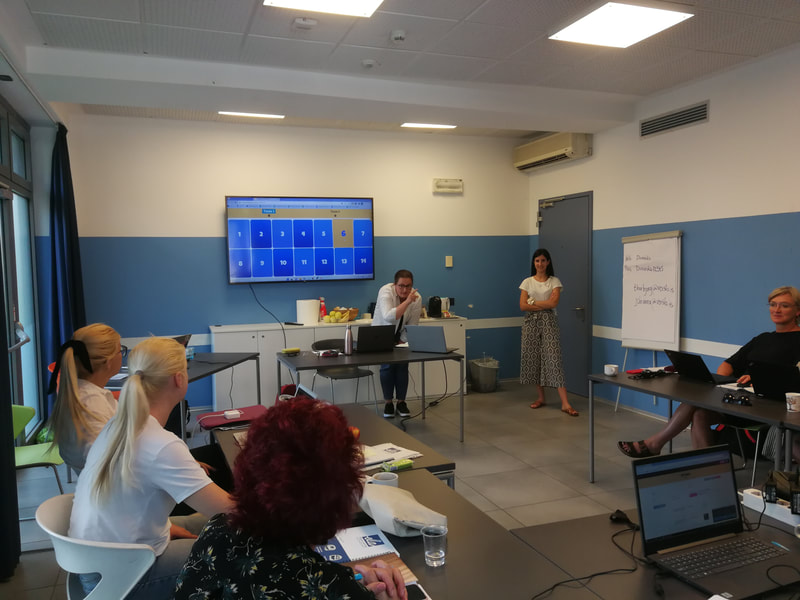
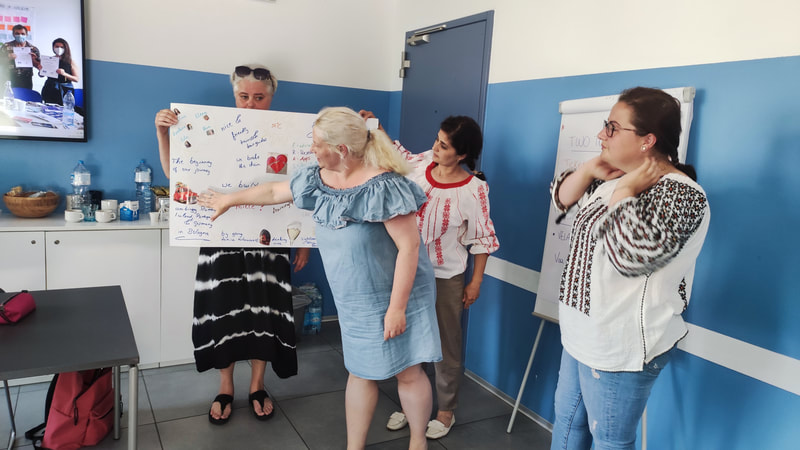
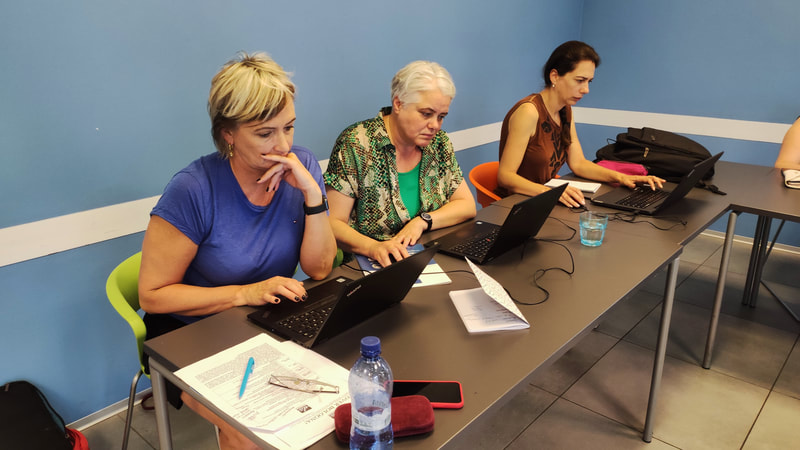
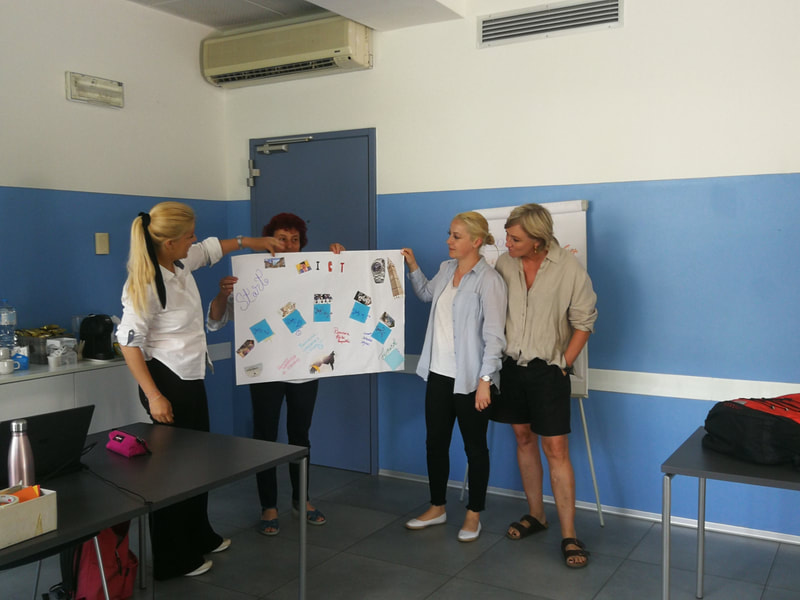
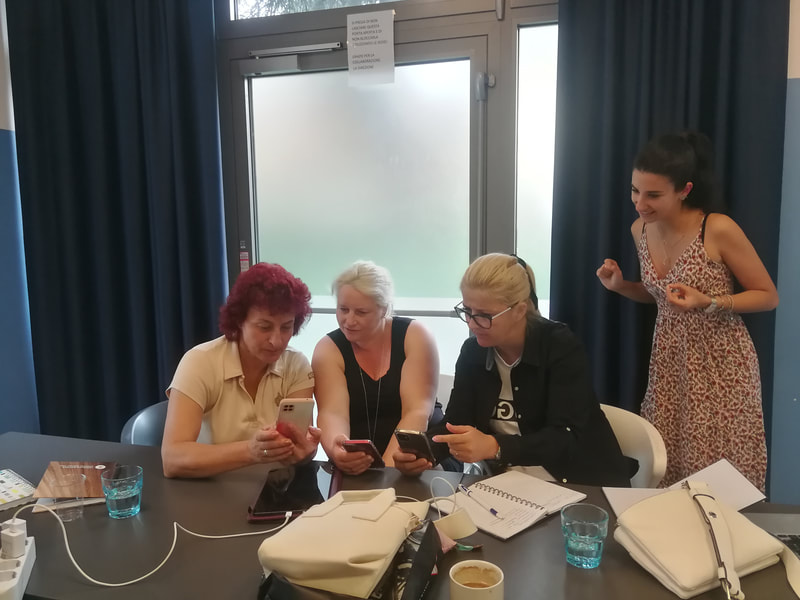
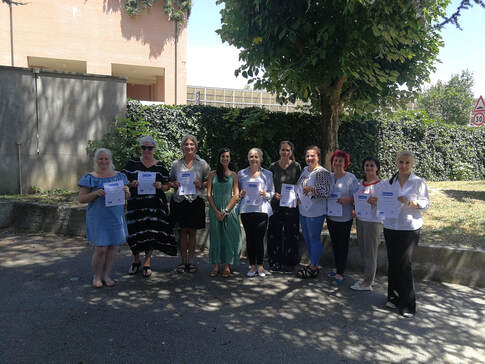
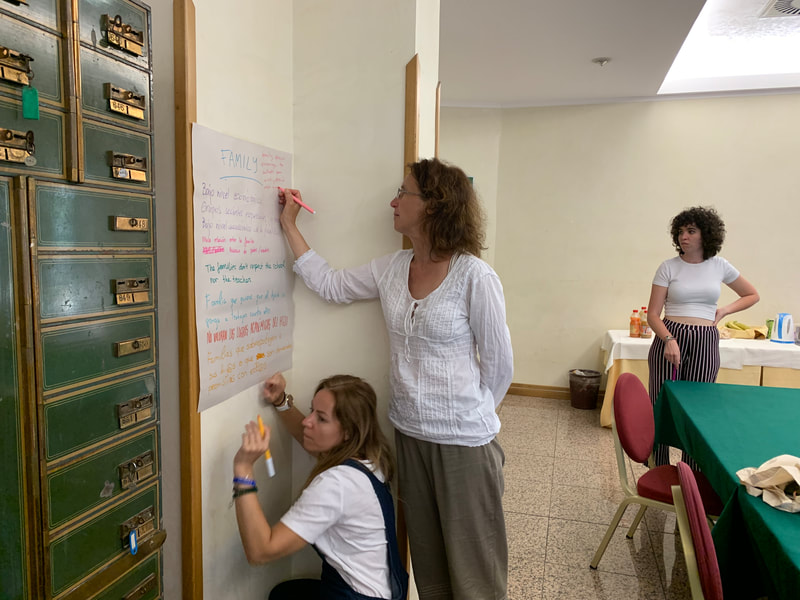
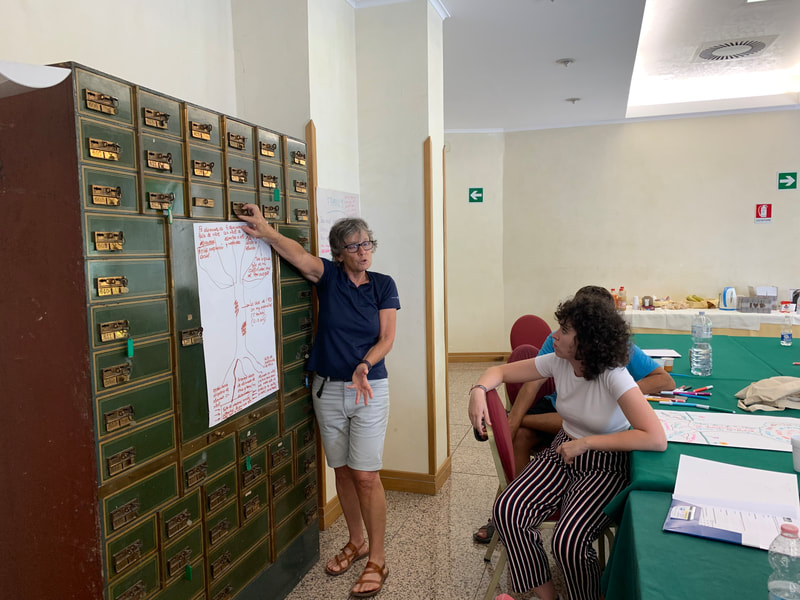
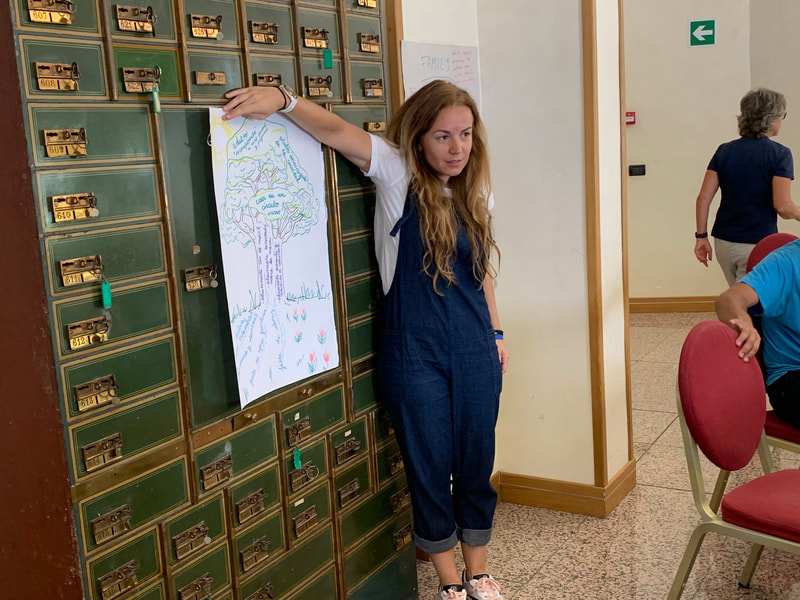
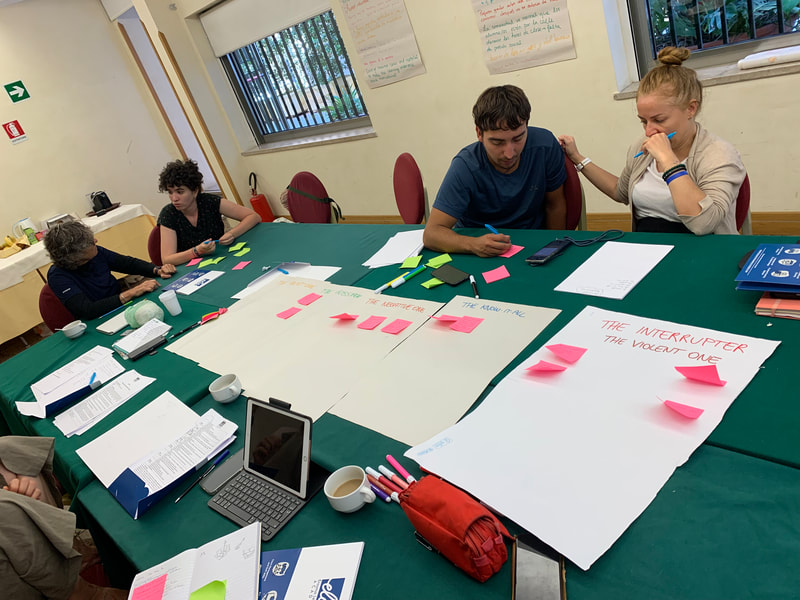
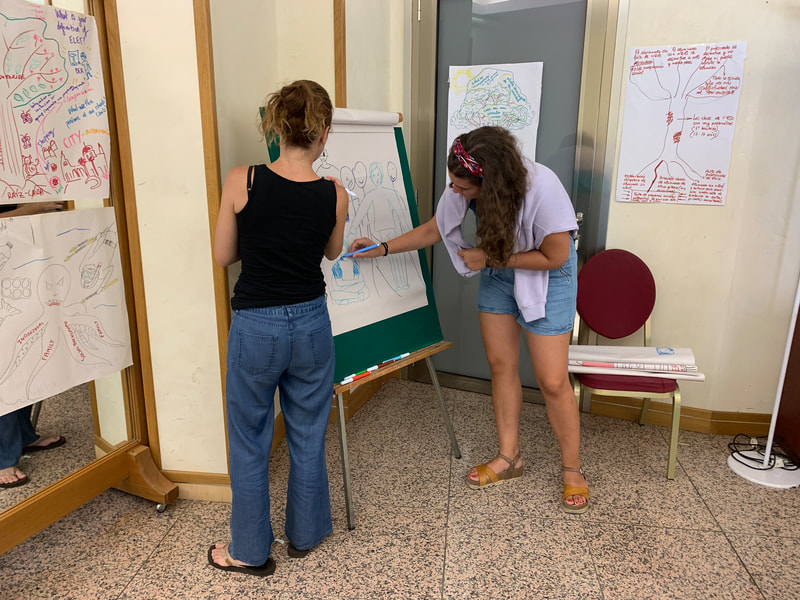
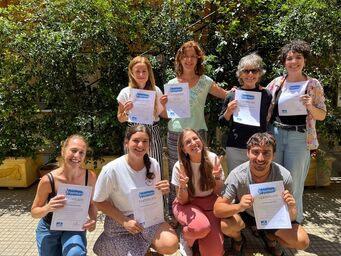
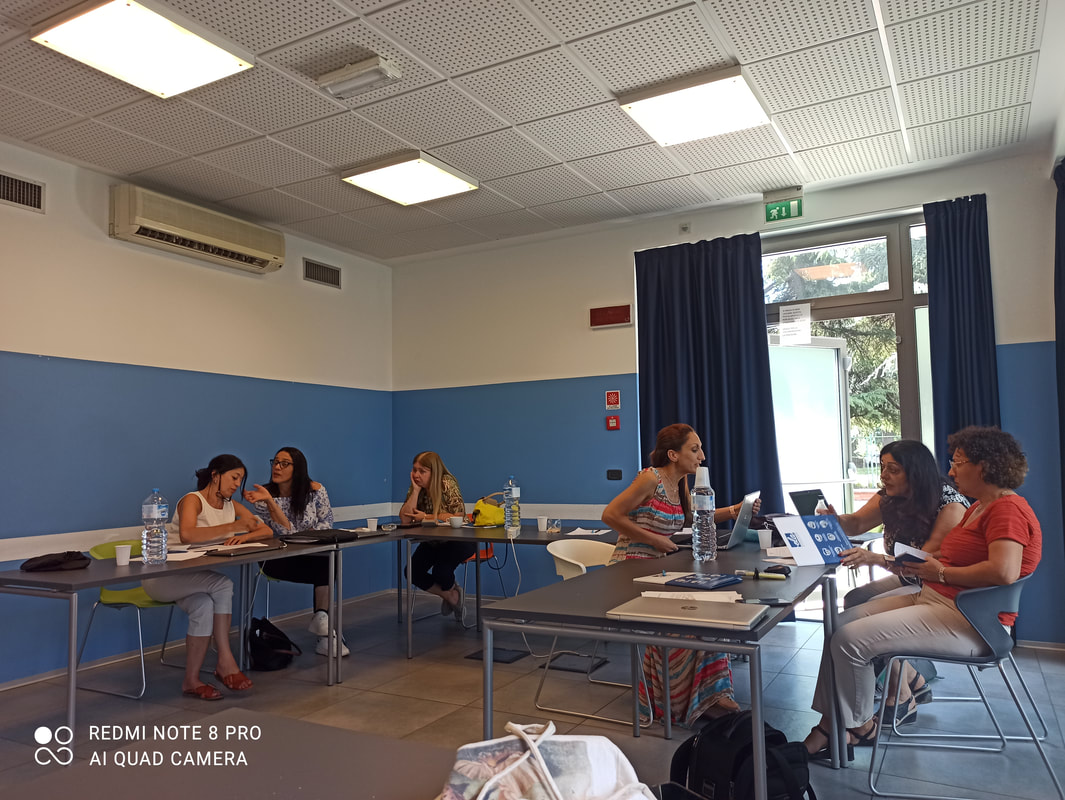
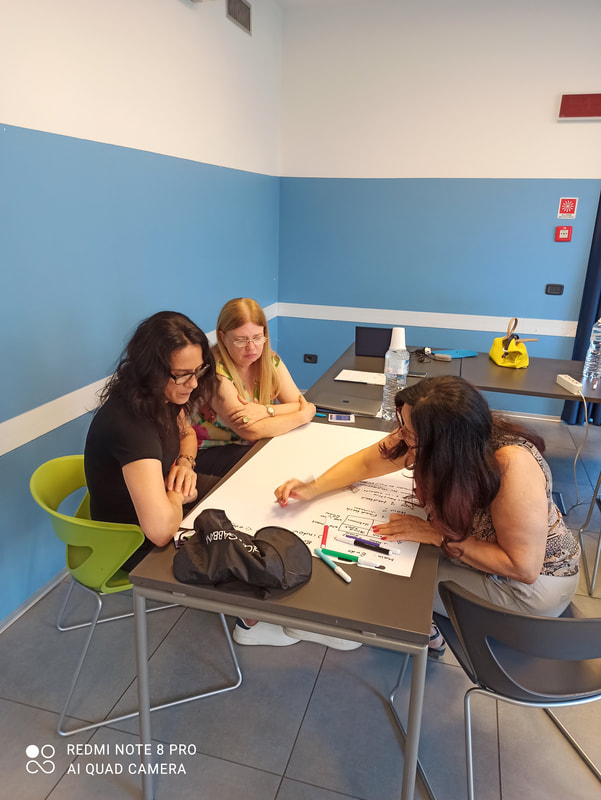
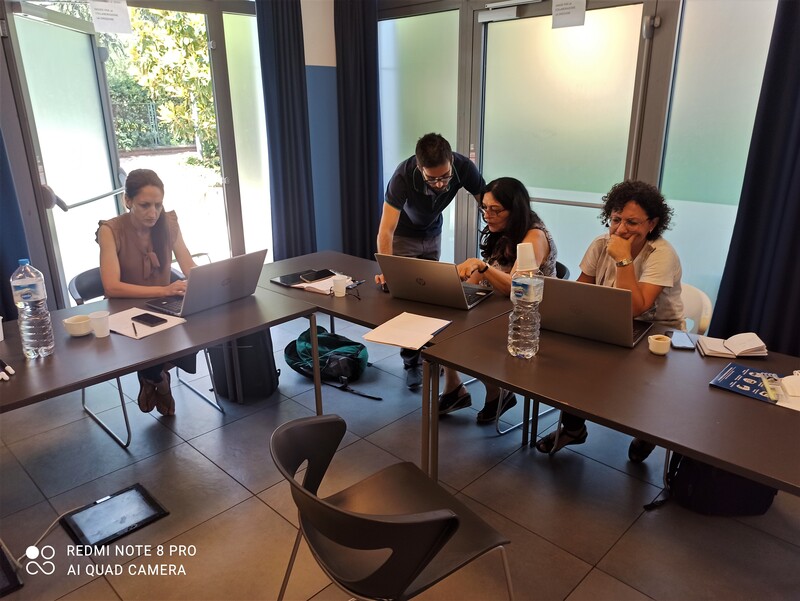
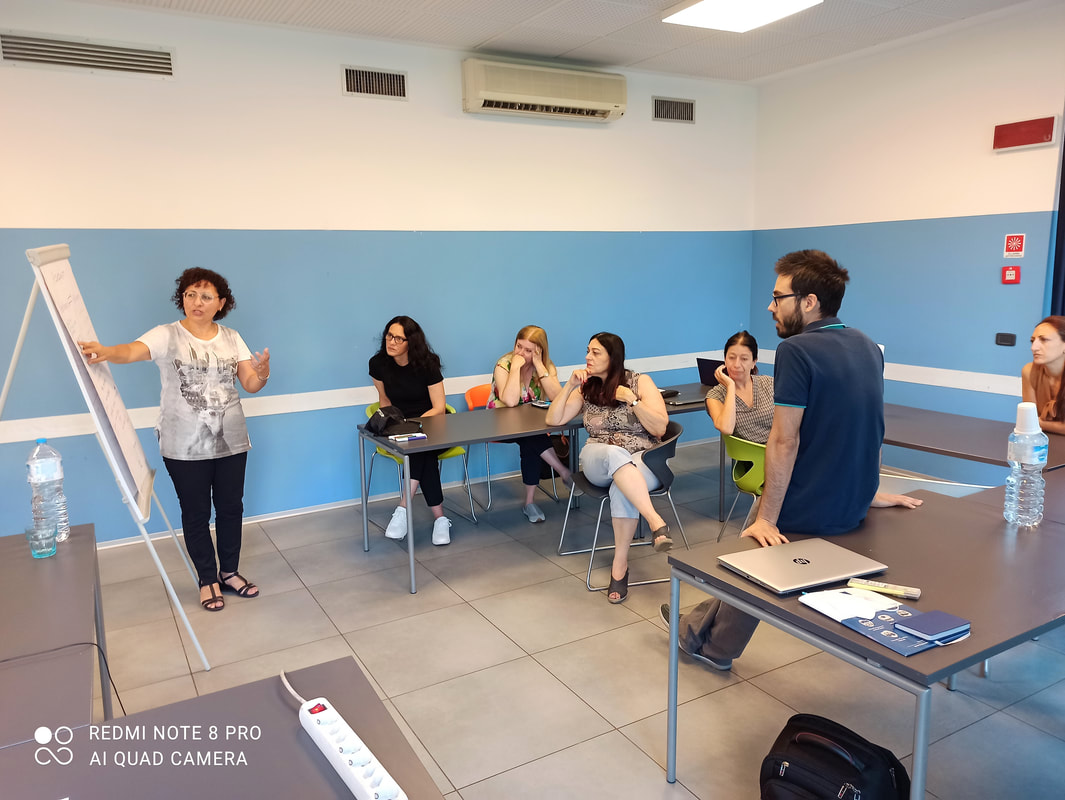
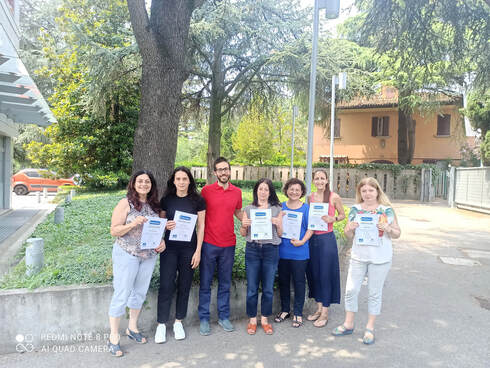
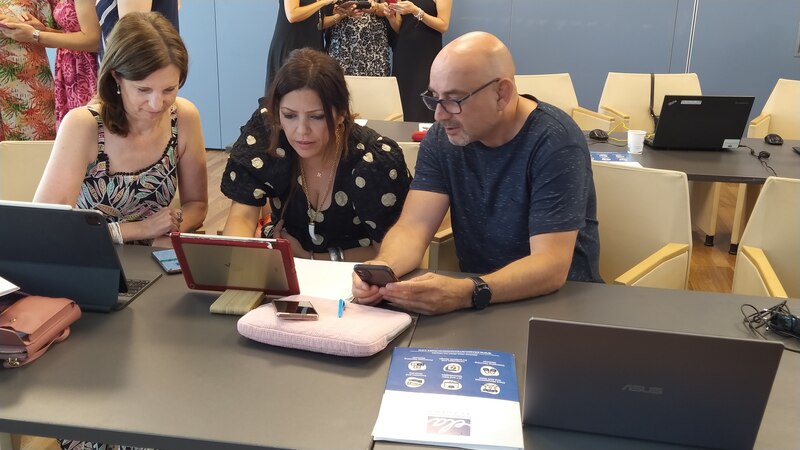
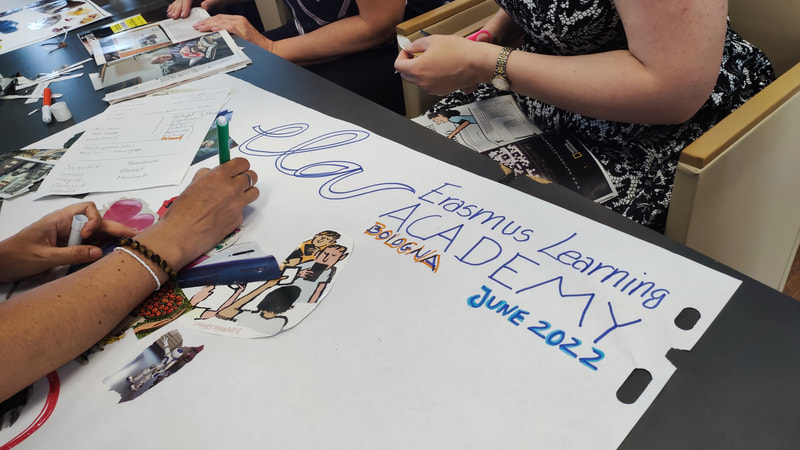
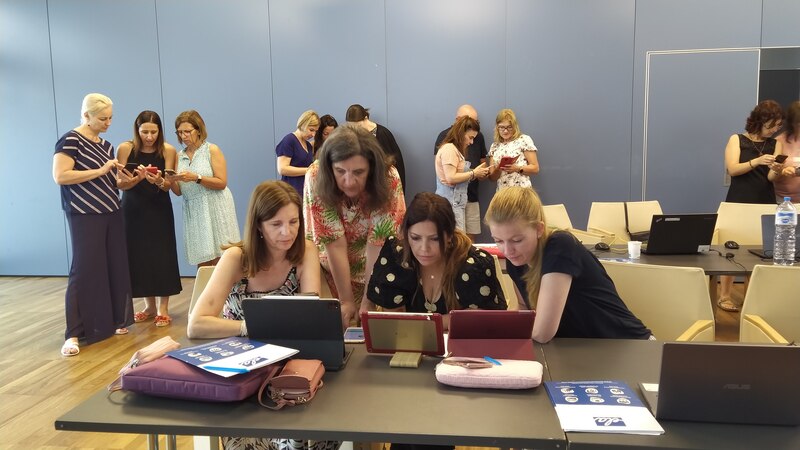
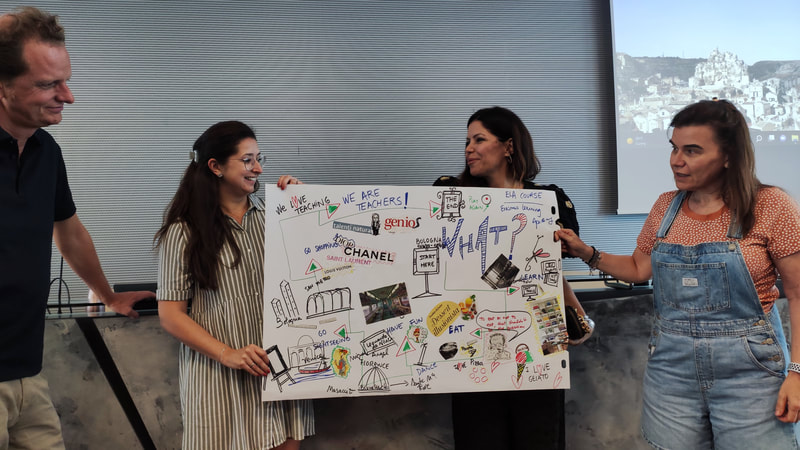
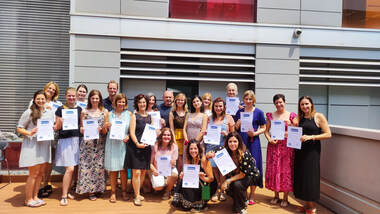


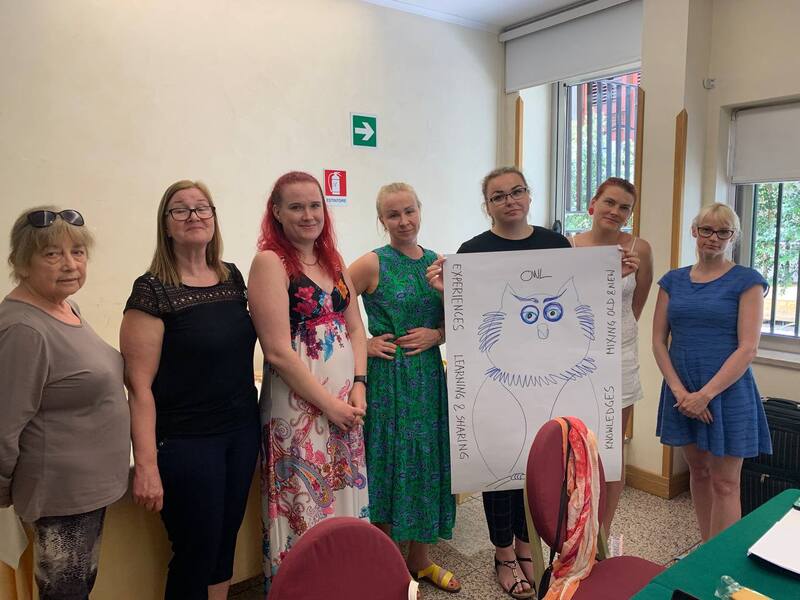
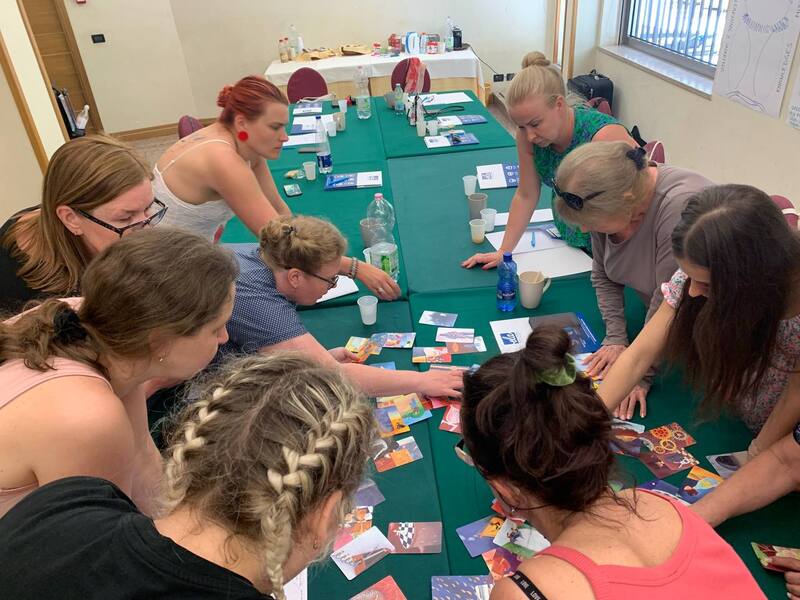
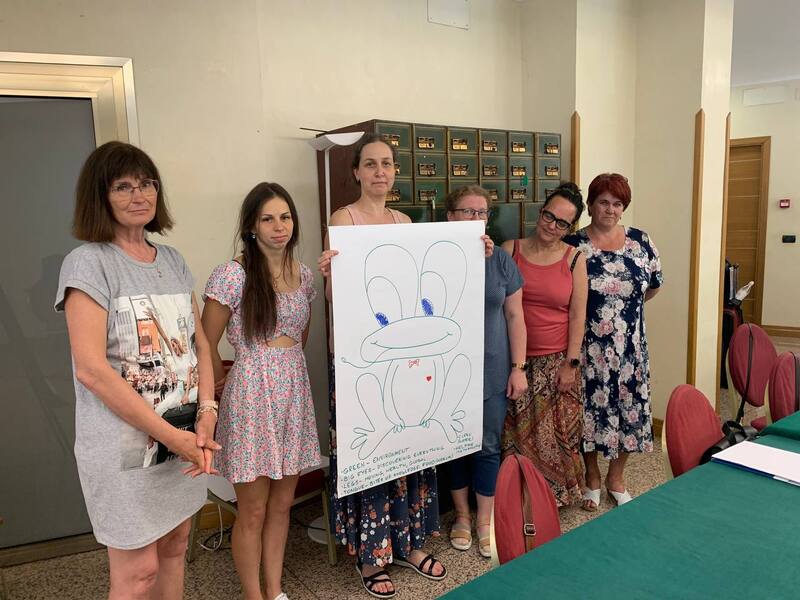
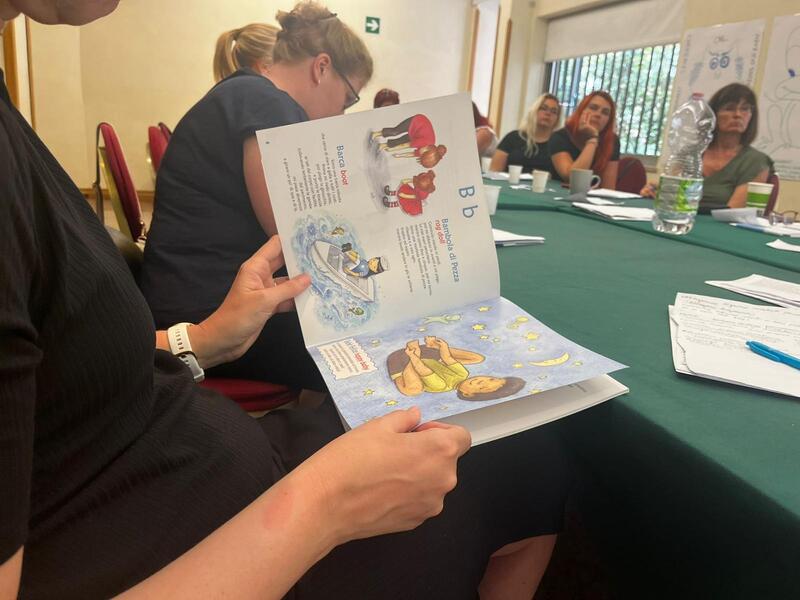
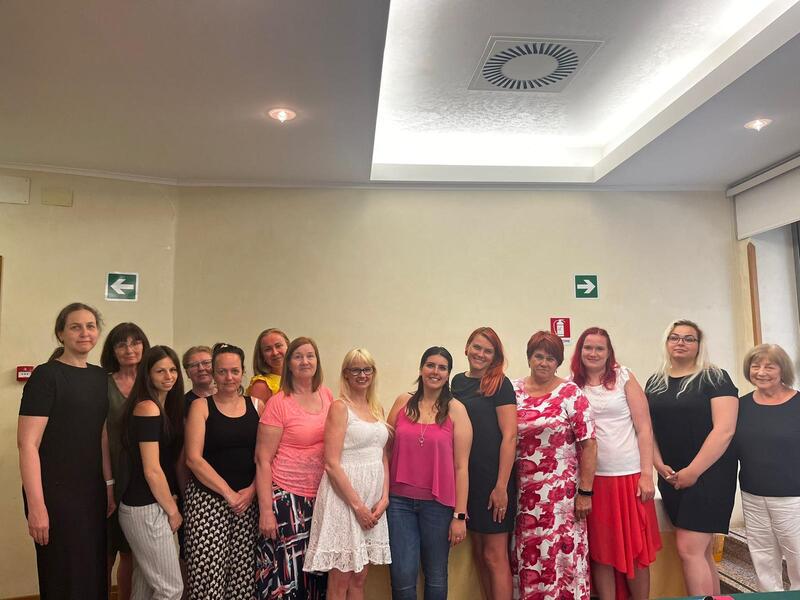
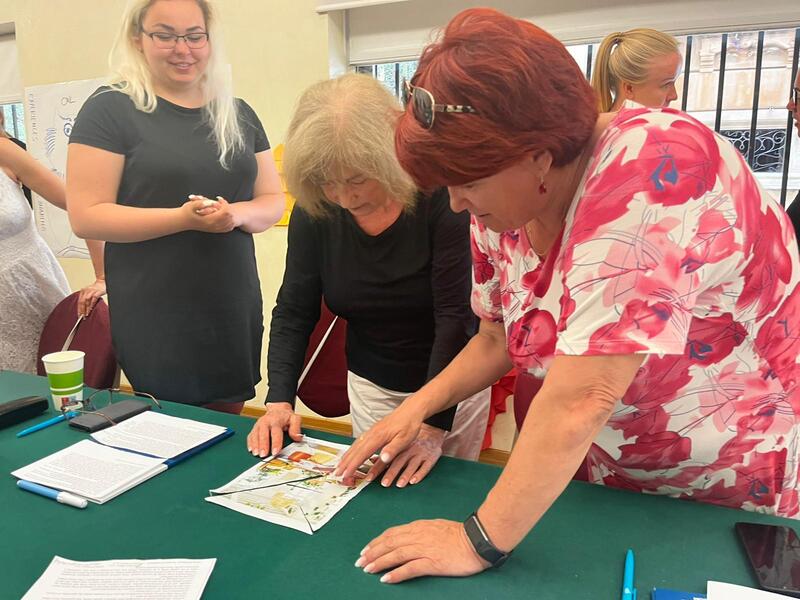
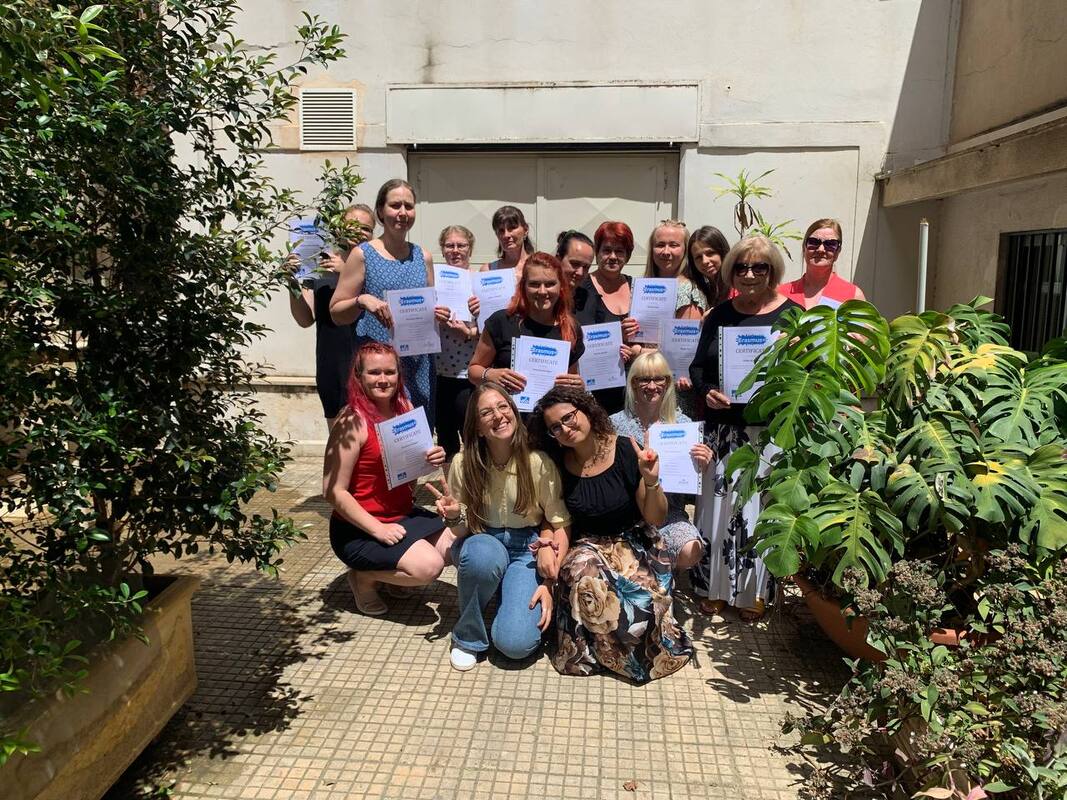
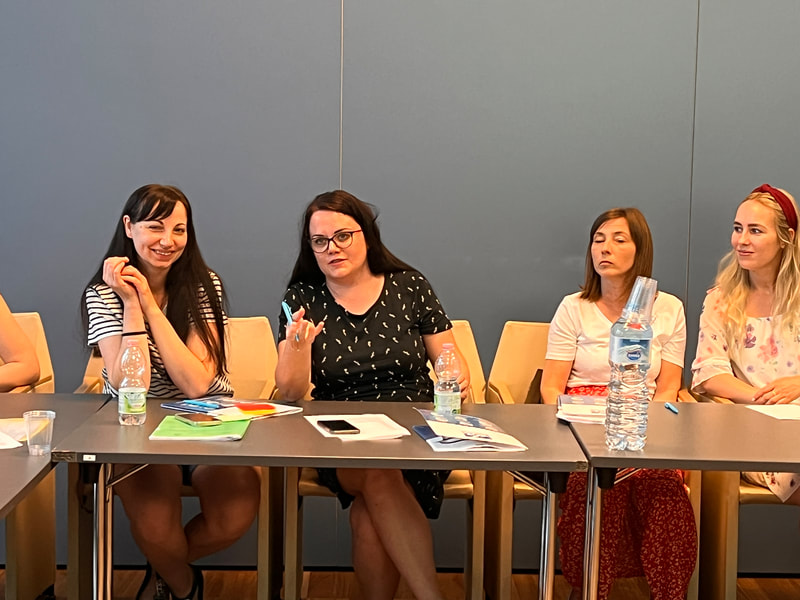
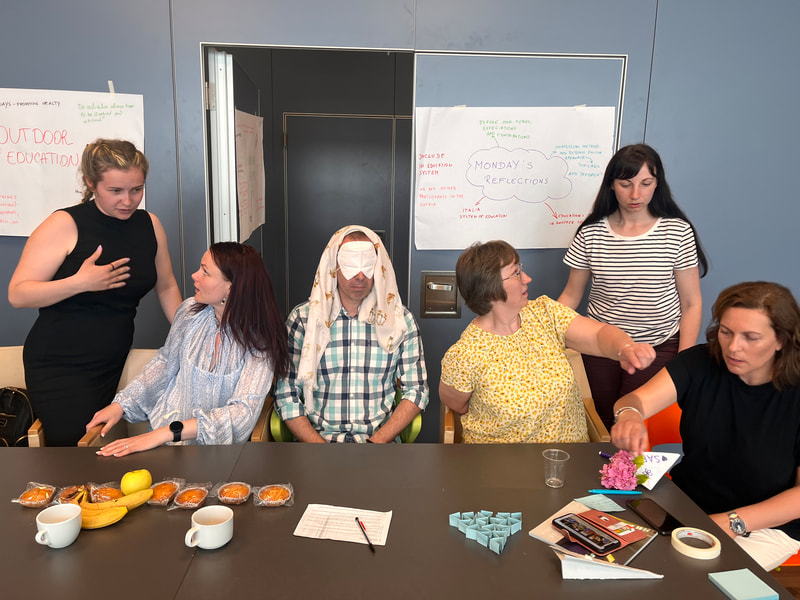
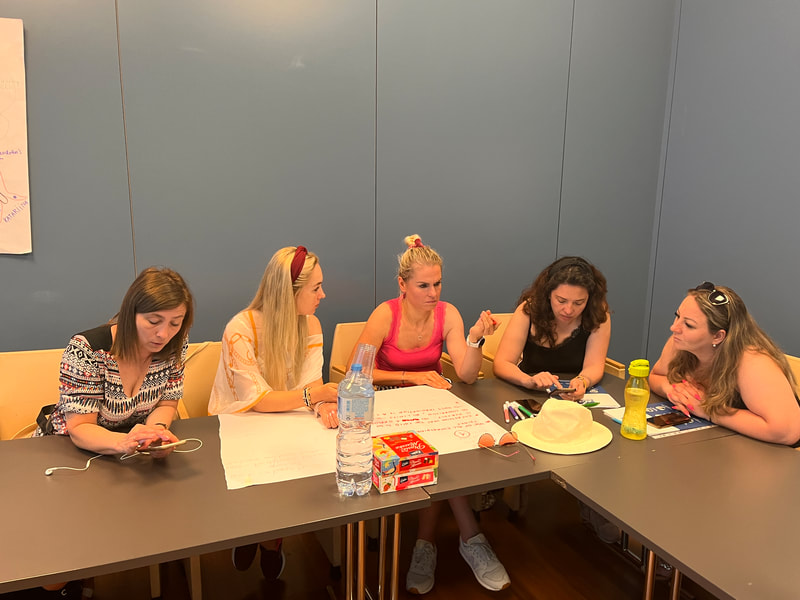
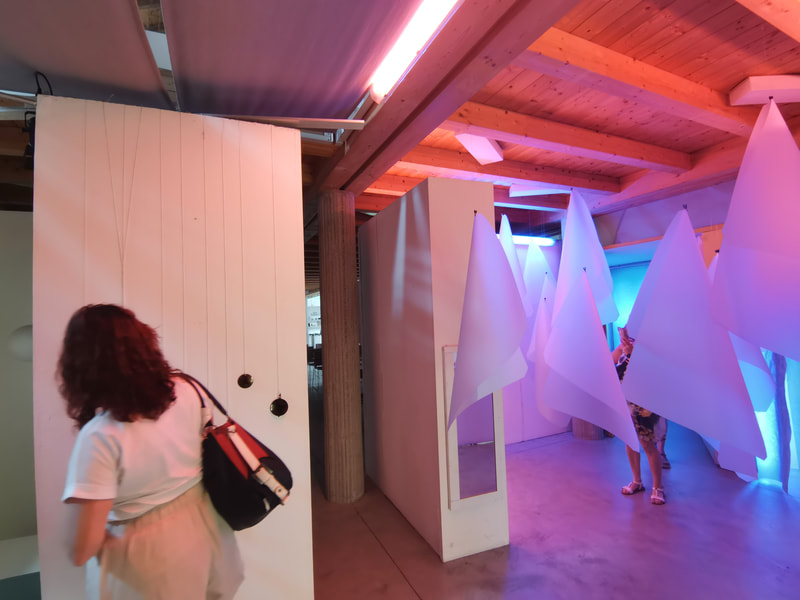
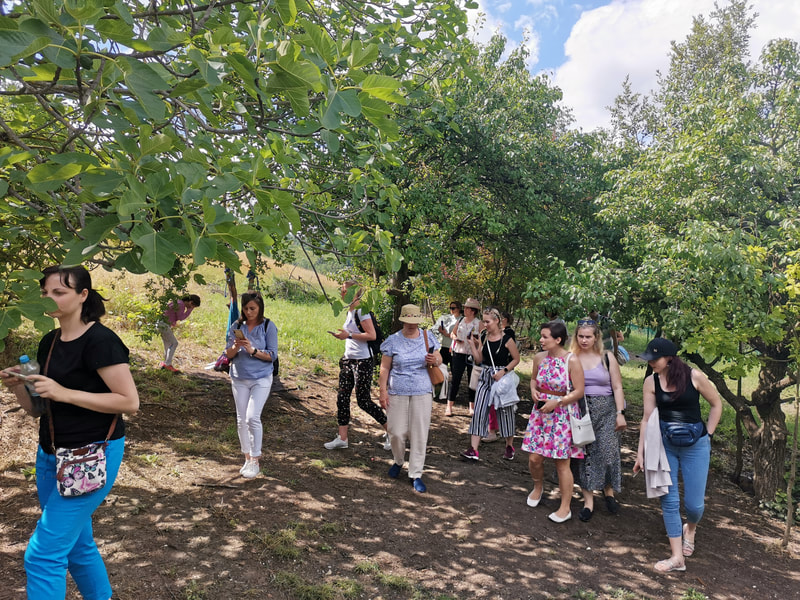
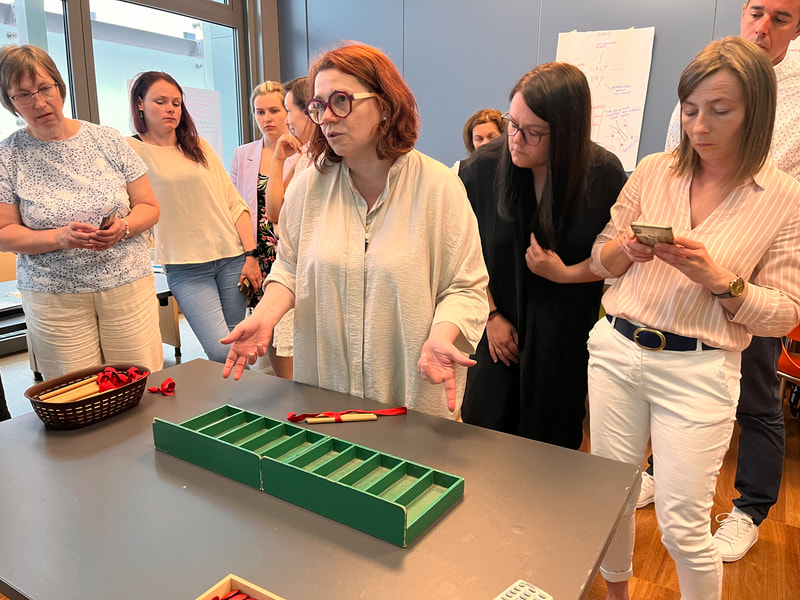
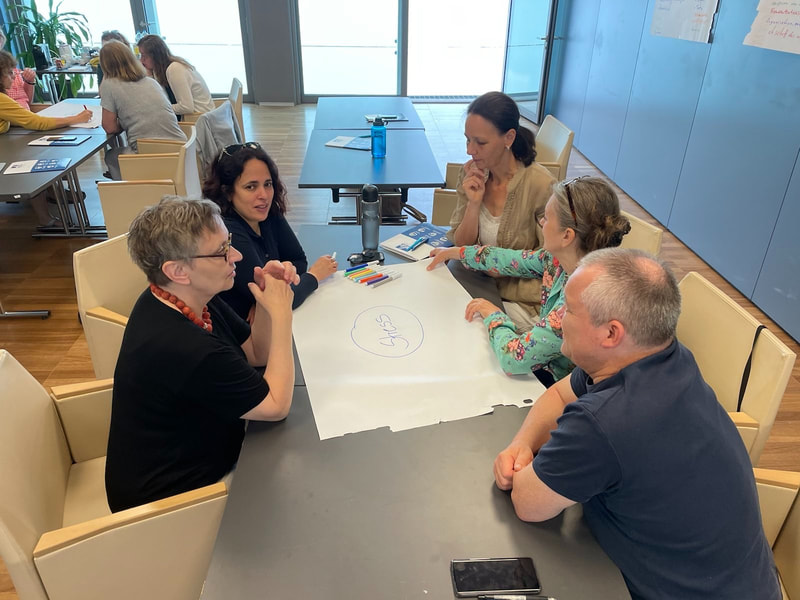
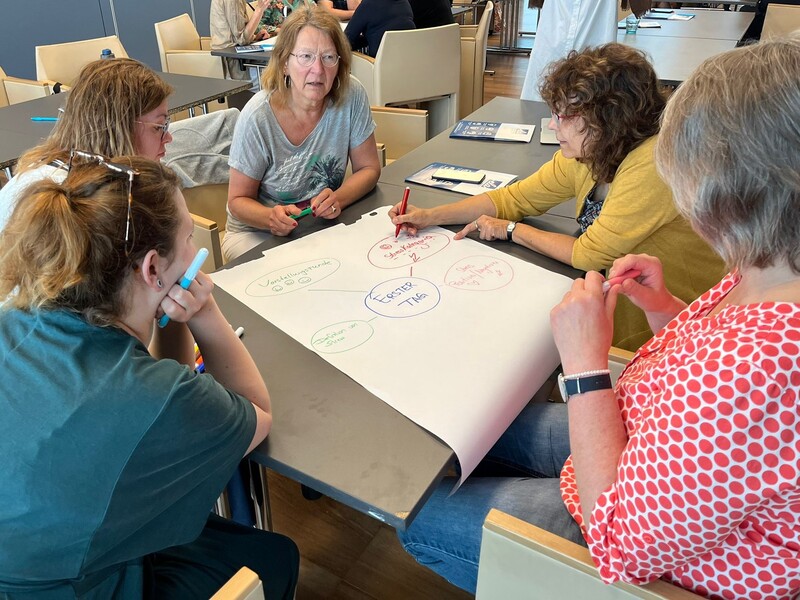
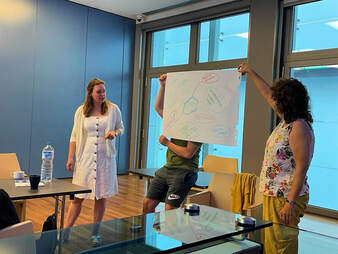
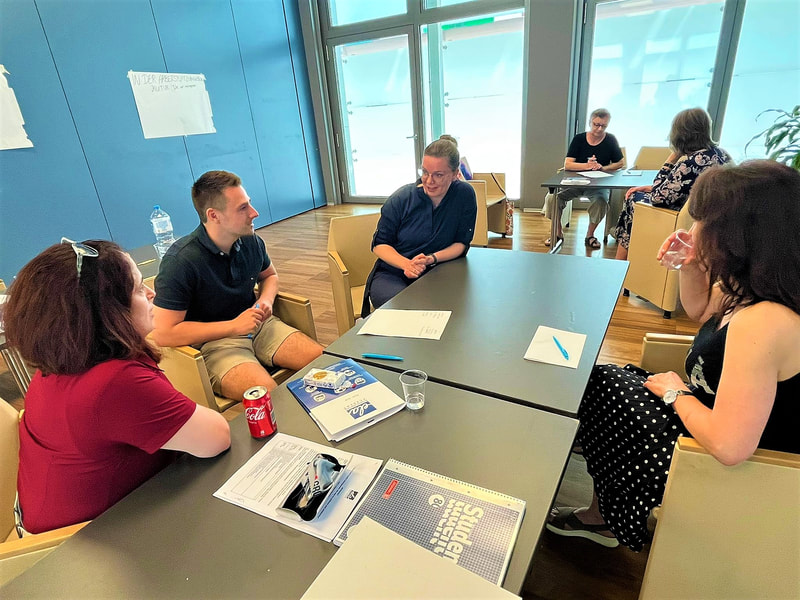
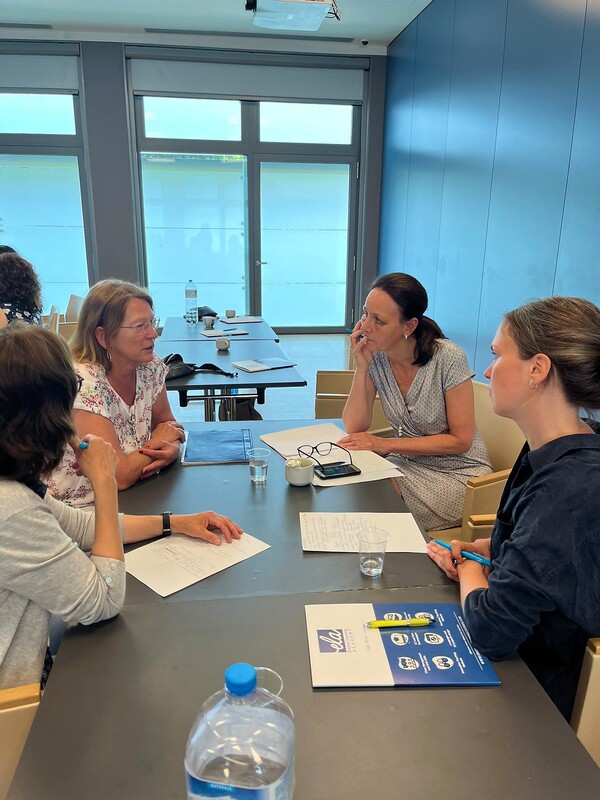
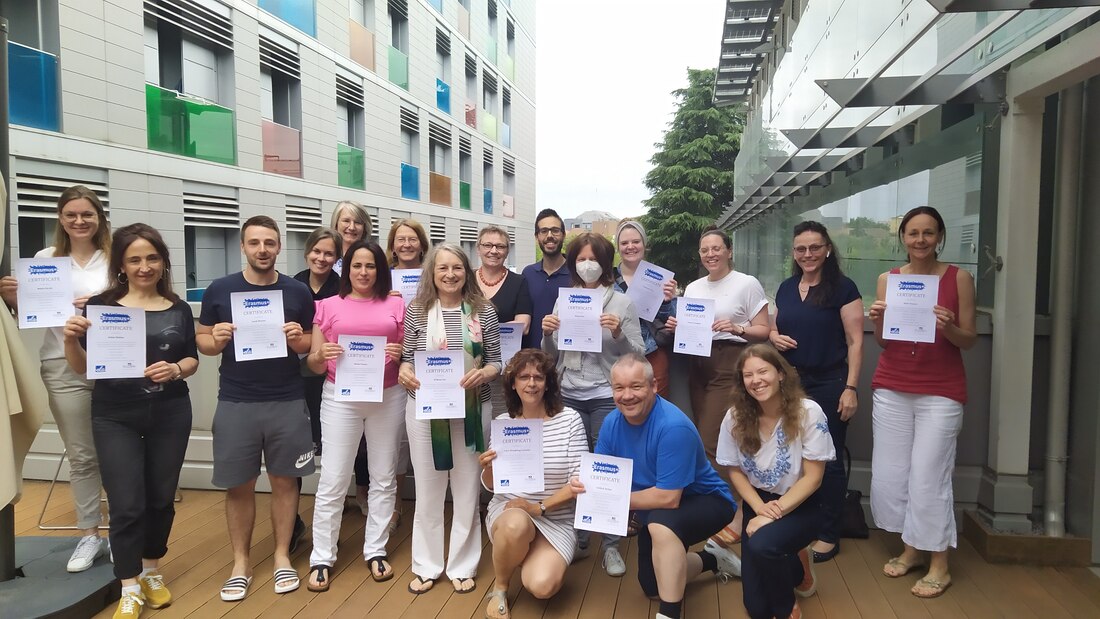
 RSS Feed
RSS Feed









